Why you can trust Tom's Hardware
Gaming Performance on Ryzen 9 7950X and Ryzen 5 7600X — The TLDR
We’re jumping to game testing results here, but be sure to check out our IPC and power testing after the application benchmarks.
Below you can see the geometric mean of our gaming tests at 1080p and 1440p, with each resolution split into its own chart. Be aware that a different mix of game titles could yield somewhat different results (particularly with the Ryzen 7 5800X3D), but this serves as a solid overall indicator of gaming performance. As usual, we're testing with an Nvidia GeForce RTX 3090 to reduce GPU-imposed bottlenecks as much as possible, and differences between test subjects will shrink with lesser cards or higher resolutions. You'll find further game-by-game breakdowns below.
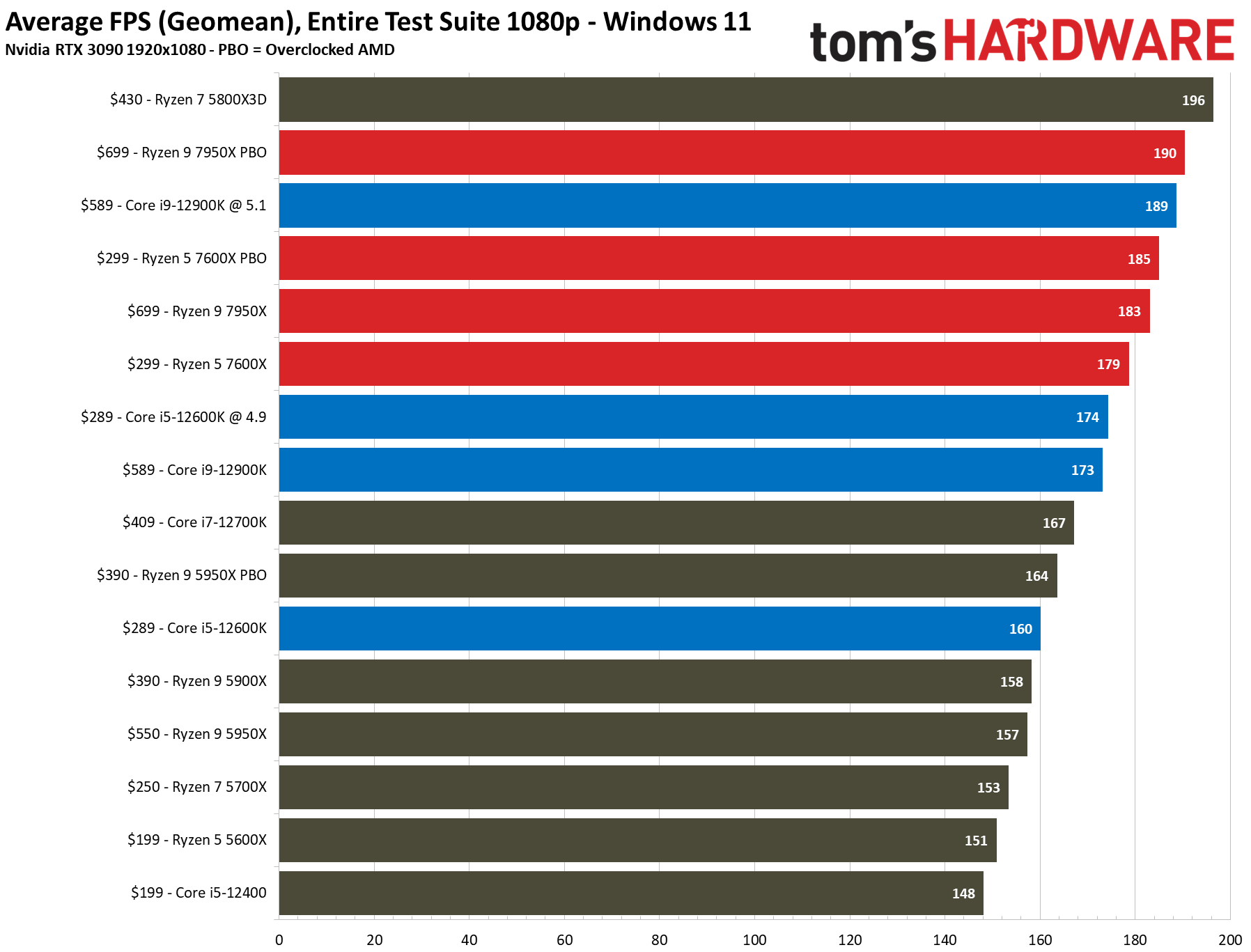
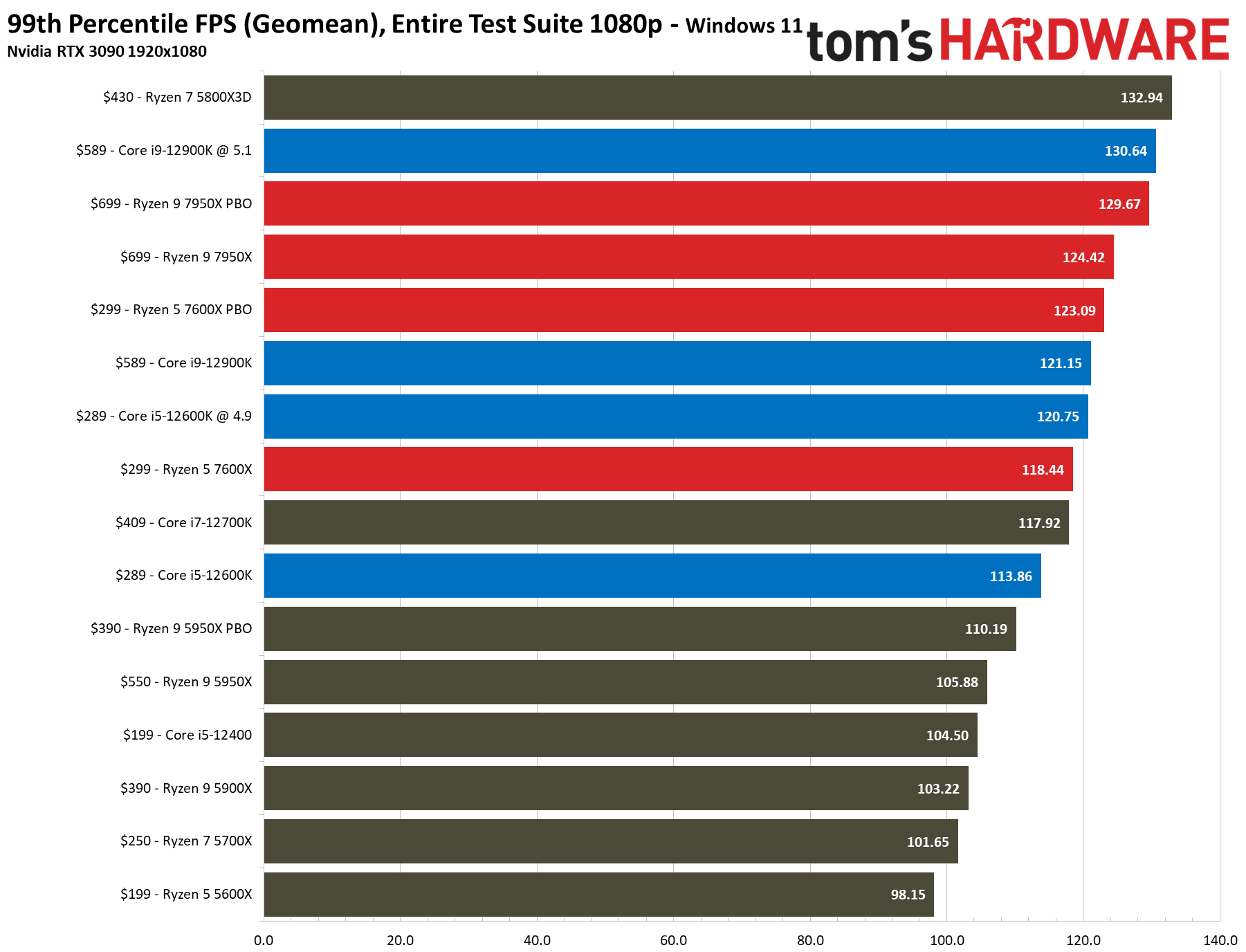
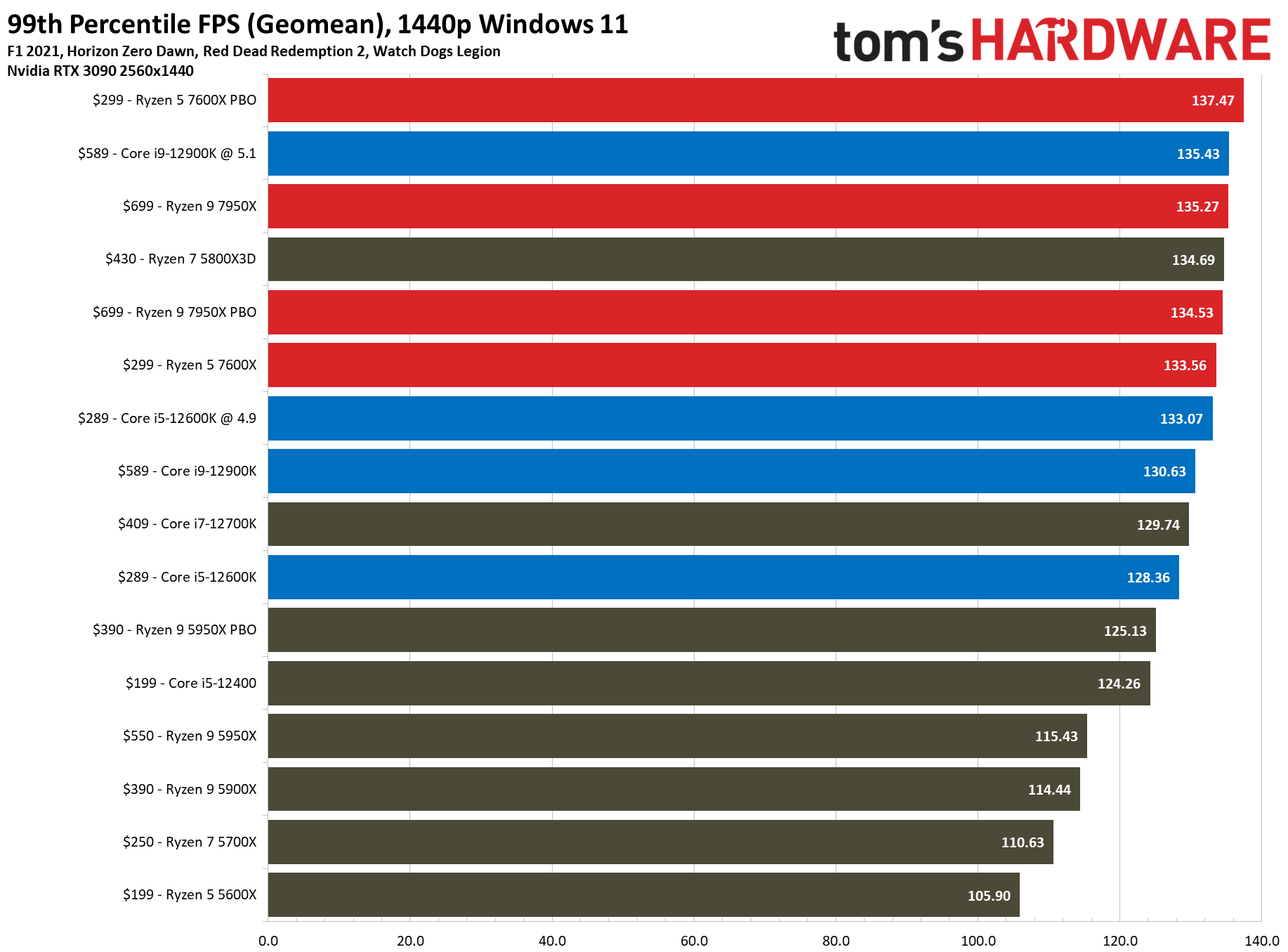
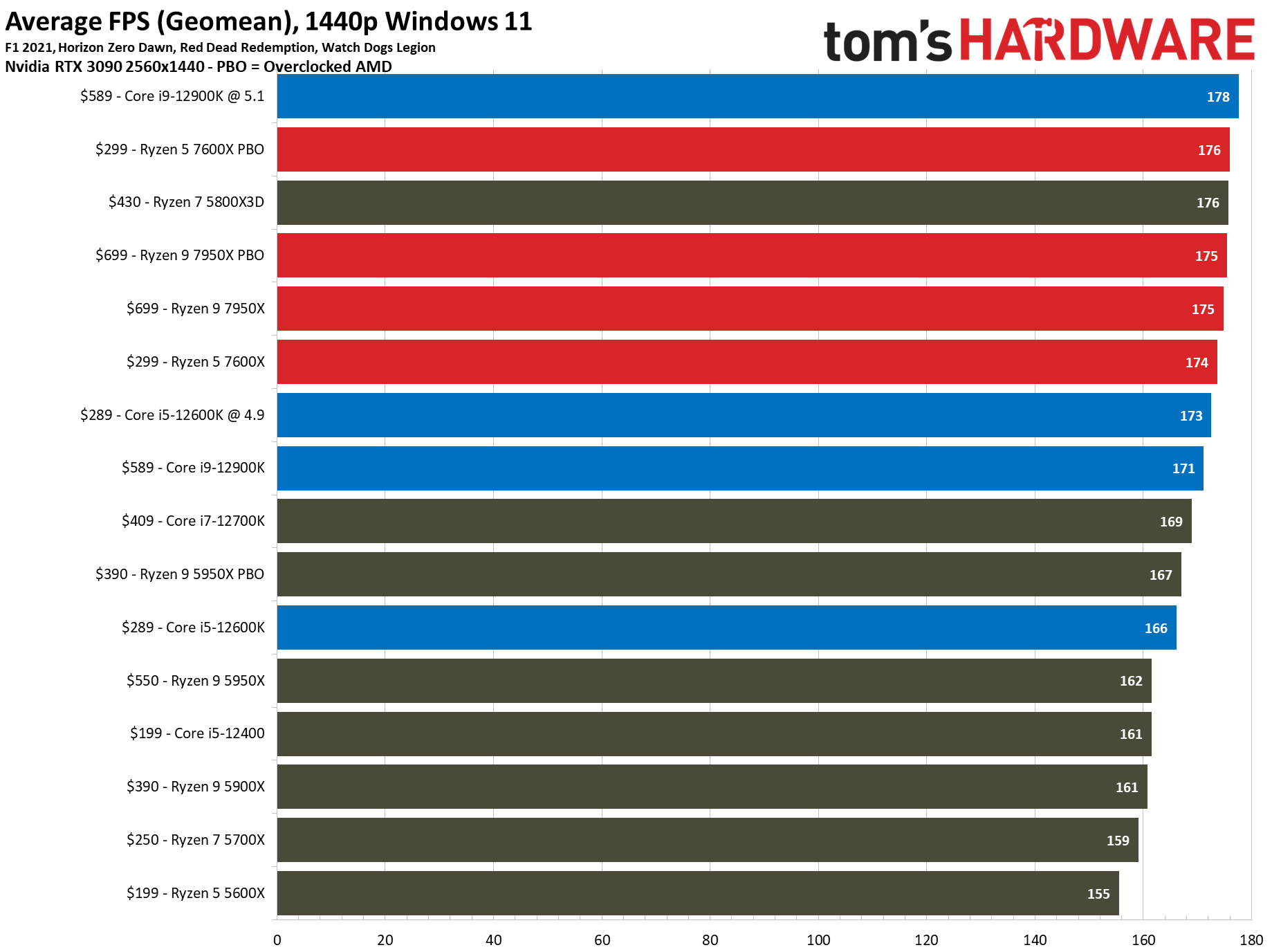
The $699 Ryzen 9 7950X takes second place in its stock configuration with a 5% lead over Intel’s fastest gaming chip, the Core i9-12900K. The 7950X is another ~2% faster after overclocking the cores and memory, essentially tying the overclocked 12900K. This marks a big generational improvement — the Ryzen 9 7950X is 17% faster than its prior-gen counterpart, the Zen 3-powered Ryzen 9 5950X, which also comes with 16 cores. However, Intel only needs to gain ~5% with Raptor Lake to match the 7950X in gaming, setting the stage for quite the competition next month.
The $299 Ryzen 5 7600X is 12% faster than the $289 Core i5-12600K, with the lead narrowing to 6% after overclocking both chips. More impressively, the stock 7600X is 4% faster than Intel’s flagship Core i9-12900K, bringing a new level of value to the $300 price point — with the caveat that you’ll have to deal with higher platform costs.
Notably, the 12900K is ~7% faster than the 7600X in our 1080p 99th percentile measurements, a good indicator of smoothness. The 7600X’s lead over the 12600K also drops to ~4%. However, we don’t see any egregious outliers in the 99th percentile measurements that would significantly alter our overall impressions of the rankings you see in the average fps chart.
The Ryzen 5 7600X also sports a big generational uplift of 18% over the Ryzen 5 5600X, which was once the darling of mid-range gaming builds. Raptor Lake looks enticing in the mid- and low-end price ranges from afar, but the 7600X will go a long way to shoring up AMD’s defenses. You can also tune the 7600X and eke out an extra ~3% of performance, but as always, gains will vary by title and by the quality of your chip.
The $300 Ryzen 5 7600X represents the entry-level for Zen 4, at least for now, but the Ryzen 9 7950X costs more than twice as much and is only 2% faster in gaming. That means the 76000X is an exceptional value for gaming, and as per usual with Ryzen 9 chips, the 7950X is really for those who need prosumer-class performance in applications.
AMD’s own $430 Ryzen 7 5800X3D remains the fastest gaming chip on the market by a fair margin, but this highly-specialized chip comes with caveats — its 3D V-Cache doesn't boost performance in all games. Additionally, the 5800X3D is optimized specifically for gaming, but it can't keep pace with similarly-priced chips in productivity applications. AMD will bring at least one Zen 4-powered Ryzen 7000 processor with 3D V-cache to market this year, so you might want to consider waiting a few more months if you’re after a specialized gaming chip of this ilk.
Get Tom's Hardware's best news and in-depth reviews, straight to your inbox.
| Tom's Hardware | 1080p Game Benchmarks - fps %age |
| $430 — Ryzen 7 5800X3D | 100% |
| $699 — Ryzen 9 7950X | 93.4% |
| $549 — Ryzen 9 7900X | 92.9% |
| $399 — Ryzen 7 7700X | 92.4% |
| $299 — Ryzen 5 7600X | 91.3% |
| $589 — Core i9-12900K | 82.3% |
| $409 — Core i7-12700K | 85.2% |
| $289 — Core i5-12600K | 81.6% |
Naturally, the differences between the chips shrink when we switch over to 1440p and bring a GPU bottleneck into play, but the story remains largely similar, with scant differences between the chips at the top of the leaderboard. The competition between Intel and AMD is even closer now, so it's best to make an informed decision based on the types of titles you play frequently.
3D Mark DX11, DX12, and Chess Engines on AMD Ryzen 9 7950X and Ryzen 5 7600X
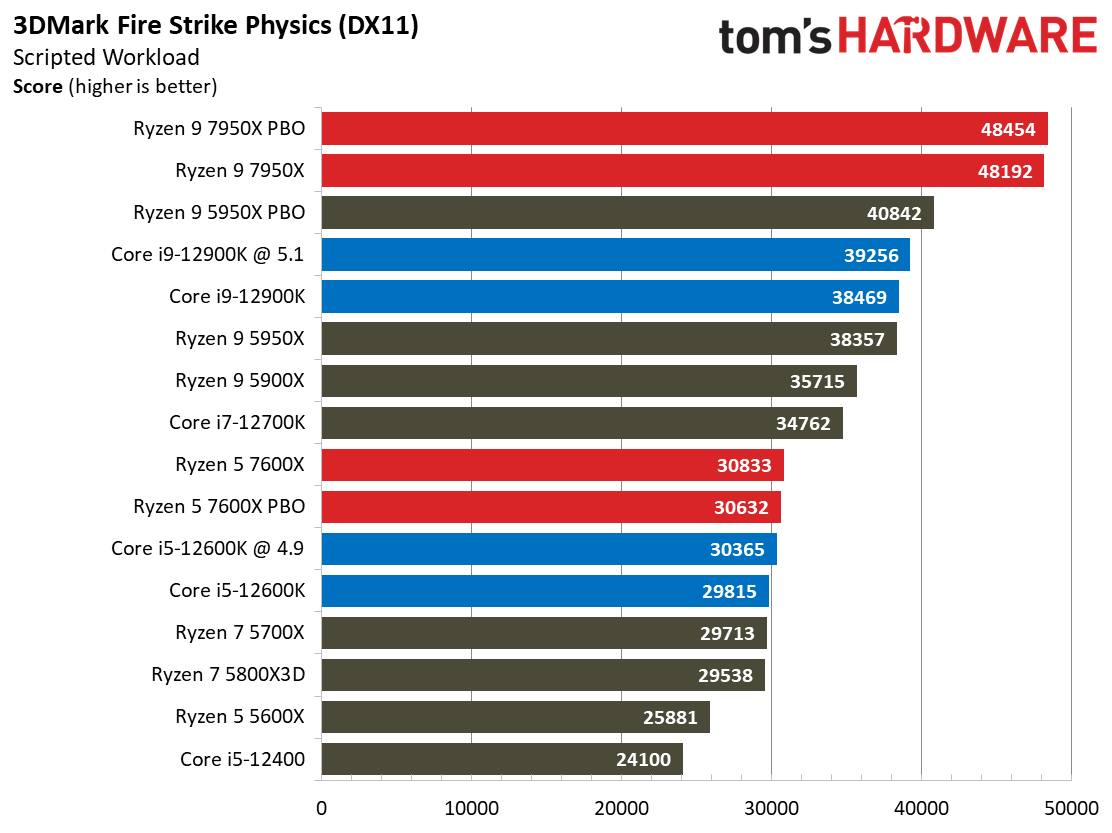
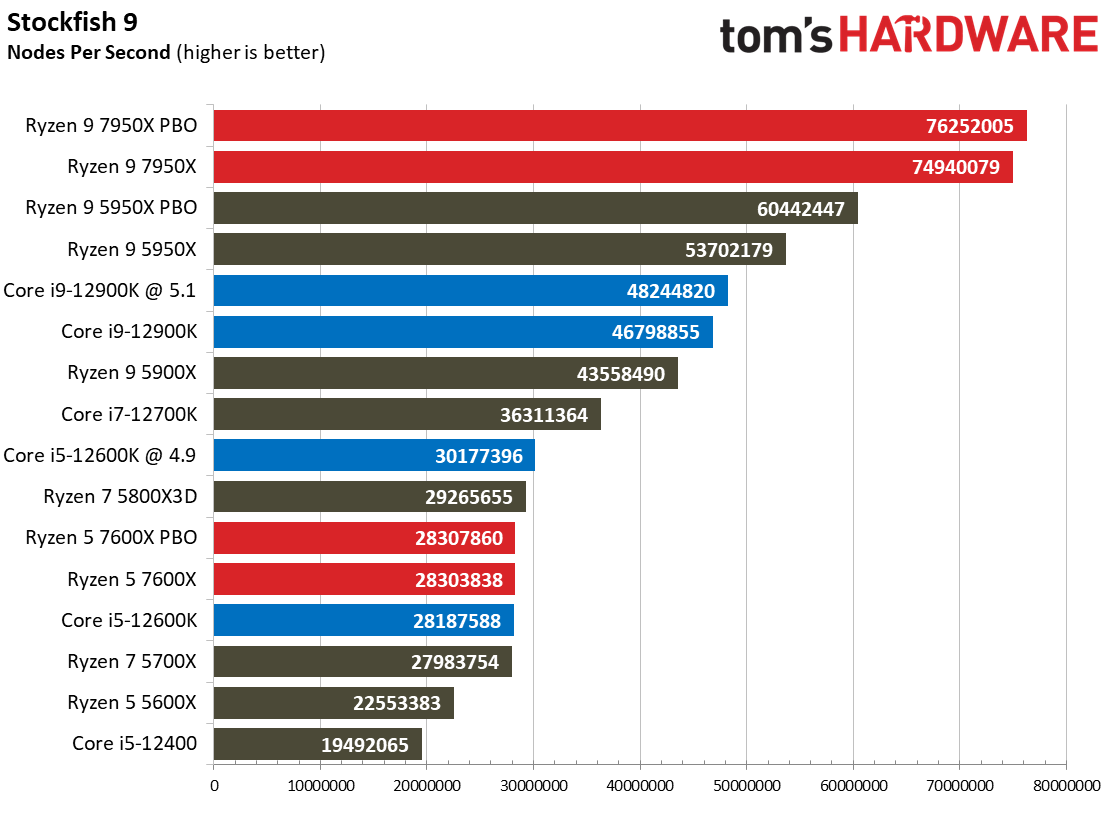
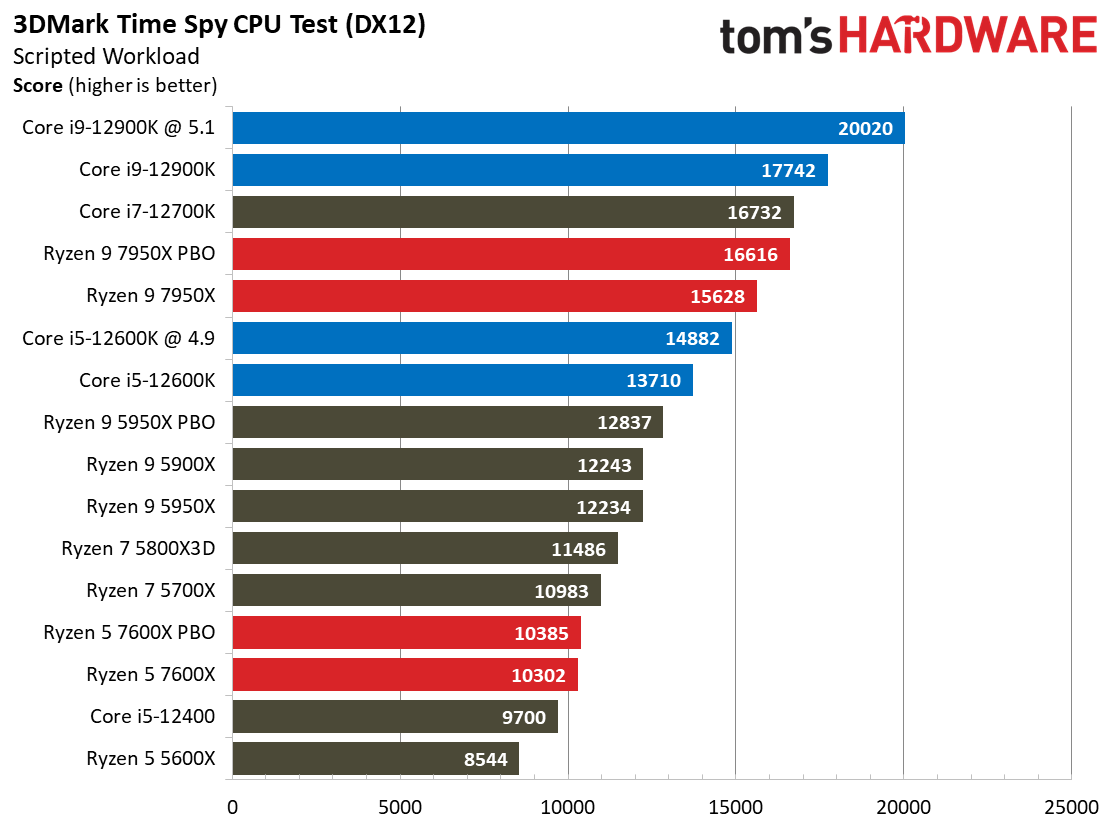
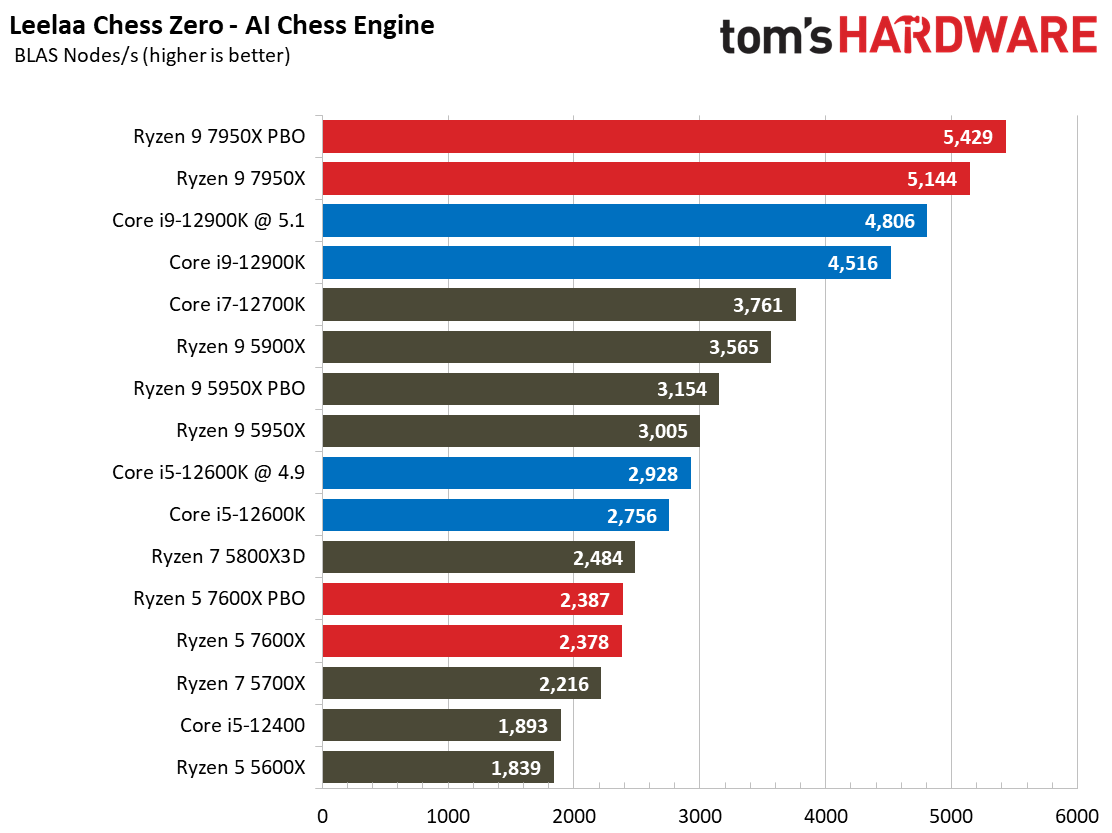
Synthetic benchmarks don't tend to translate well to real-world gaming, but they do show us the raw amount of compute power exposed to game engines. It's too bad most games don't fully exploit it.
The Ryzen 9 7950X is ~25% faster than the Core i9-12900K and the previous-gen 5950X in the DX11 CPU tests. The Ryzen 5 7600X is ~19% faster than the 5600X, slightly beating the Core i5-12600K while bringing a new level of performance to Ryzen 5.
The DX12 tests are also impressive for Ryzen 7000 — the Ryzen 9 7950X leads the 5950X by 27% while the 7600X notches a 20% improvement over the 5600X — but Intel’s price-comparable chips still hold the lead. The Core i9-12900K is 14% faster than the 7950X, while the 12600K is 32% faster than the 7600X.
The heavily-threaded chess engine benchmarks also profit from Ryzen 7000’s improved multi-threaded performance. The 7950X easily beats the 12900K by large margins in both tests, while the 7600X improves Ryzen 5’s standing against Core i5.
Far Cry 6 on AMD Ryzen 9 7950X and Ryzen 5 7600X
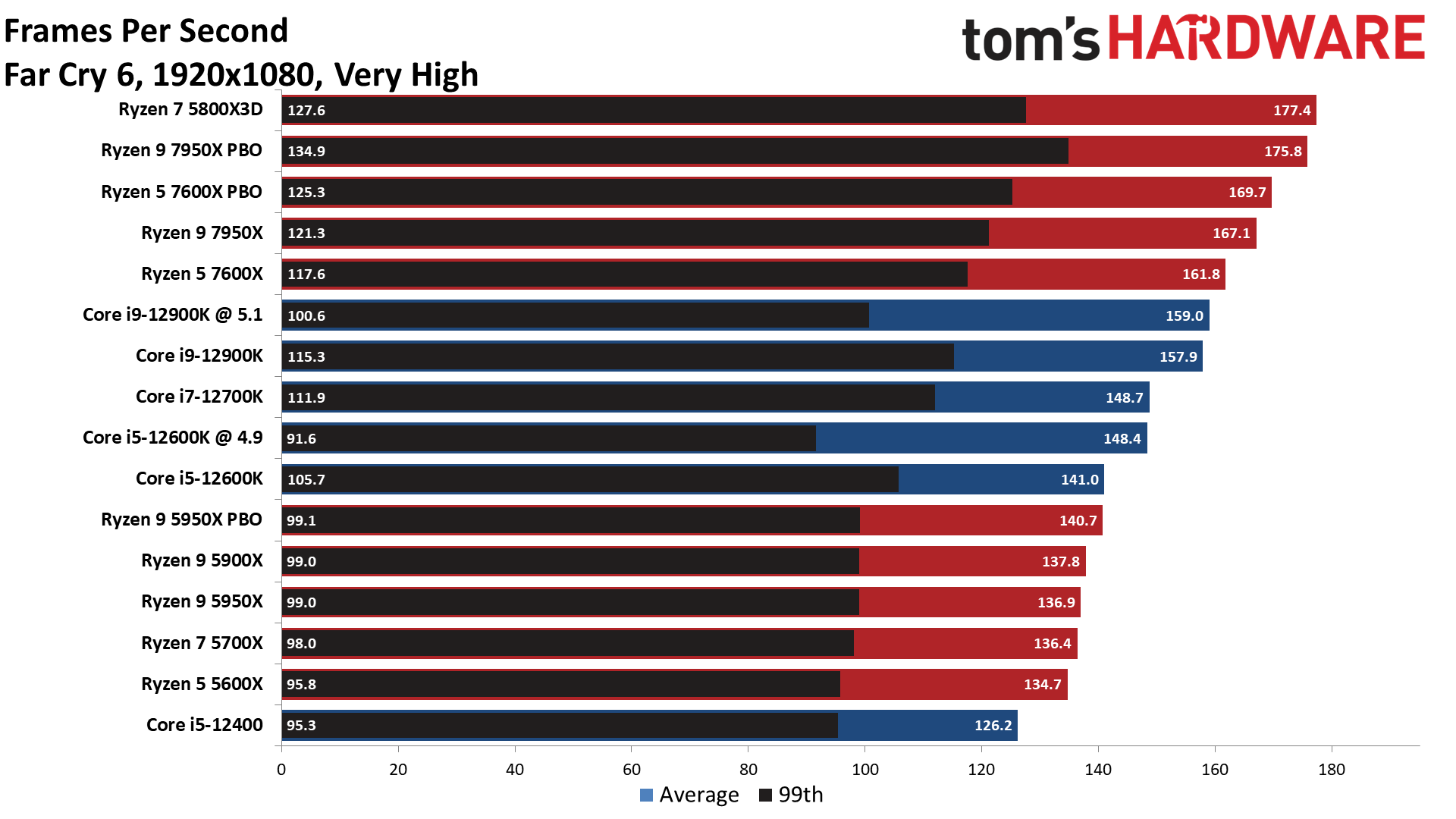
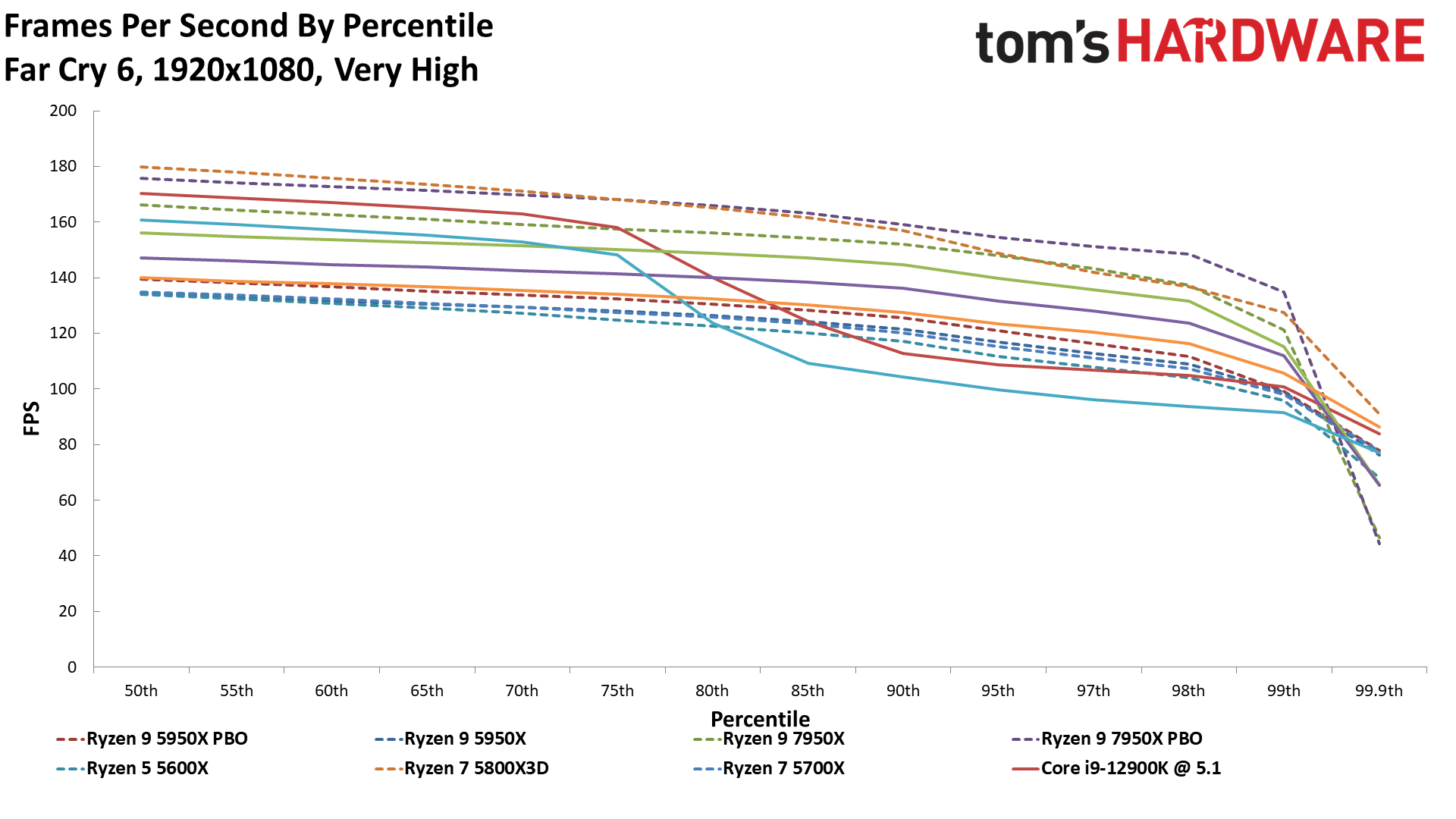
The Ryzen 7 5800X3D takes the overall lead, which we’ll see a lot as we flip through these titles, but remember that this chip can be finicky — some titles see little to no uplift.
The Ryzen 5 7600X and Ryzen 9 7950X are impressive in this series of tests with a ~21% lead over their prior-gen counterparts. They also stack up well against Alder Lake, with the 7600X being 15% faster than the 12600K, and the 7950X taking a 6% lead over the 12900K.
We see roughly the expected uptick from overclocking the Ryzen 7000 models, but you’ll notice the Alder Lake chips suffer from lower 99th percentile measurements after tuning. That’s an interesting and repeatable condition, but it seems to be confined to this title in our suite.
F1 2021 on AMD Ryzen 9 7950X and Ryzen 5 7600X
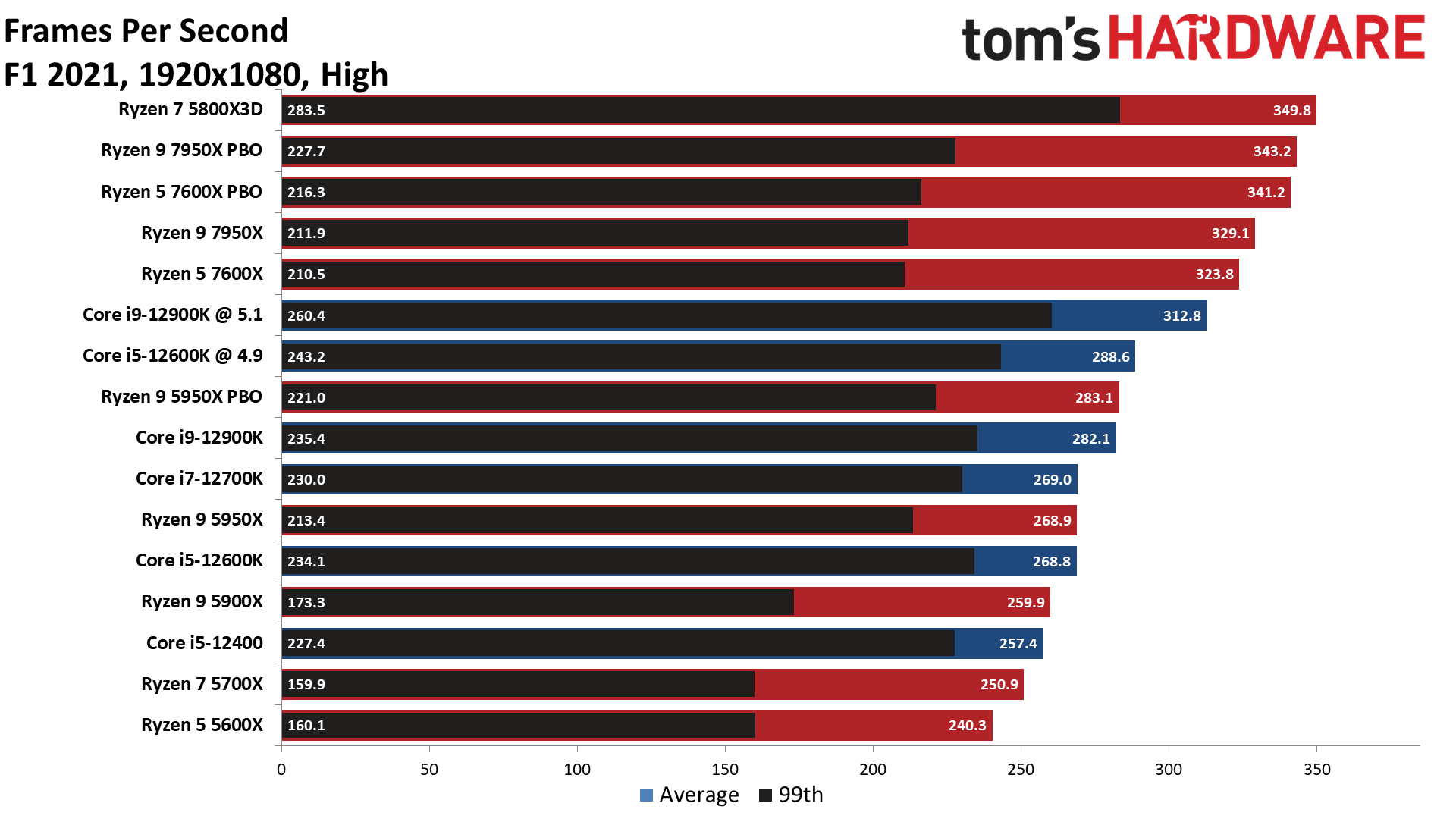
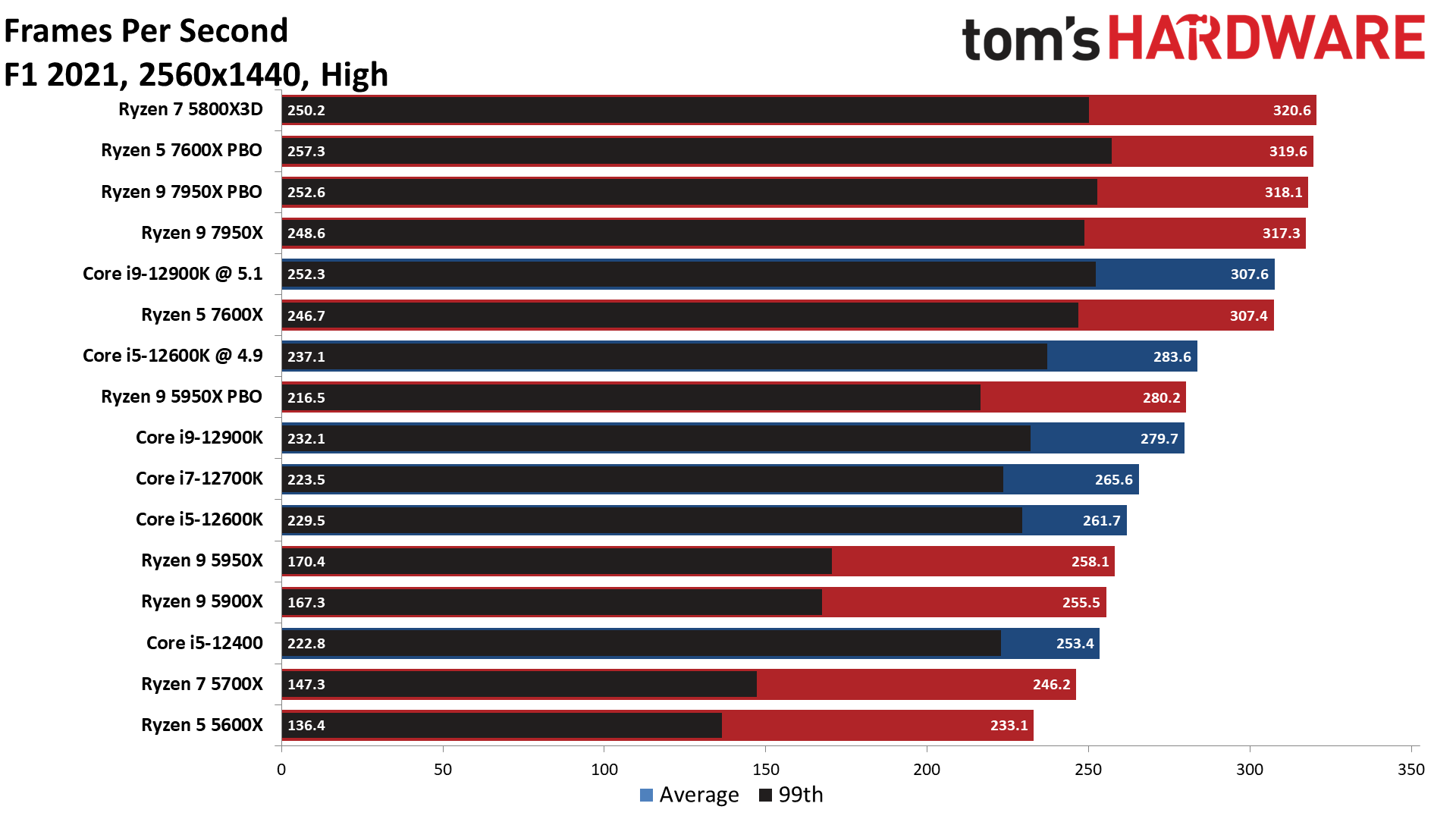
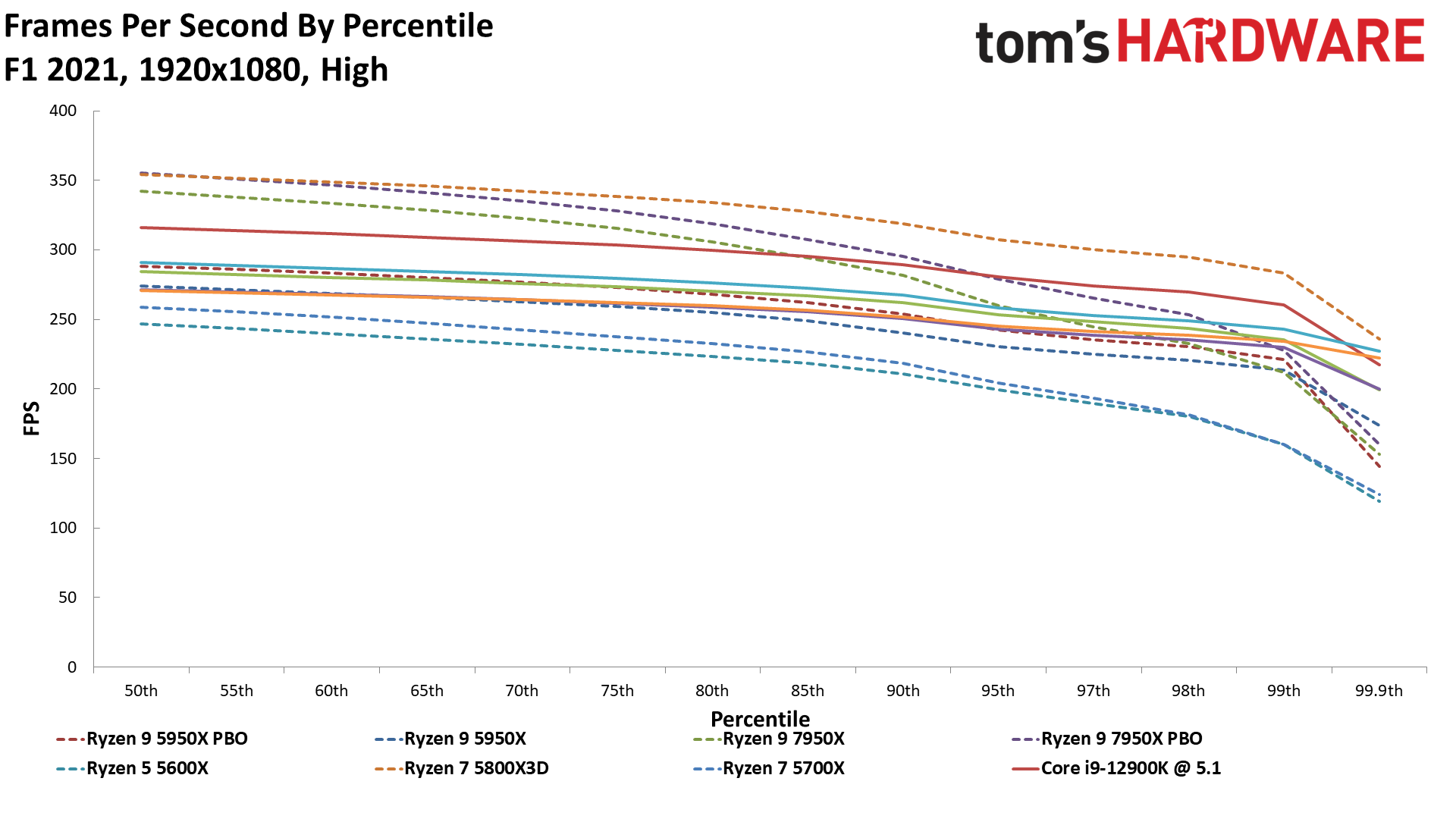
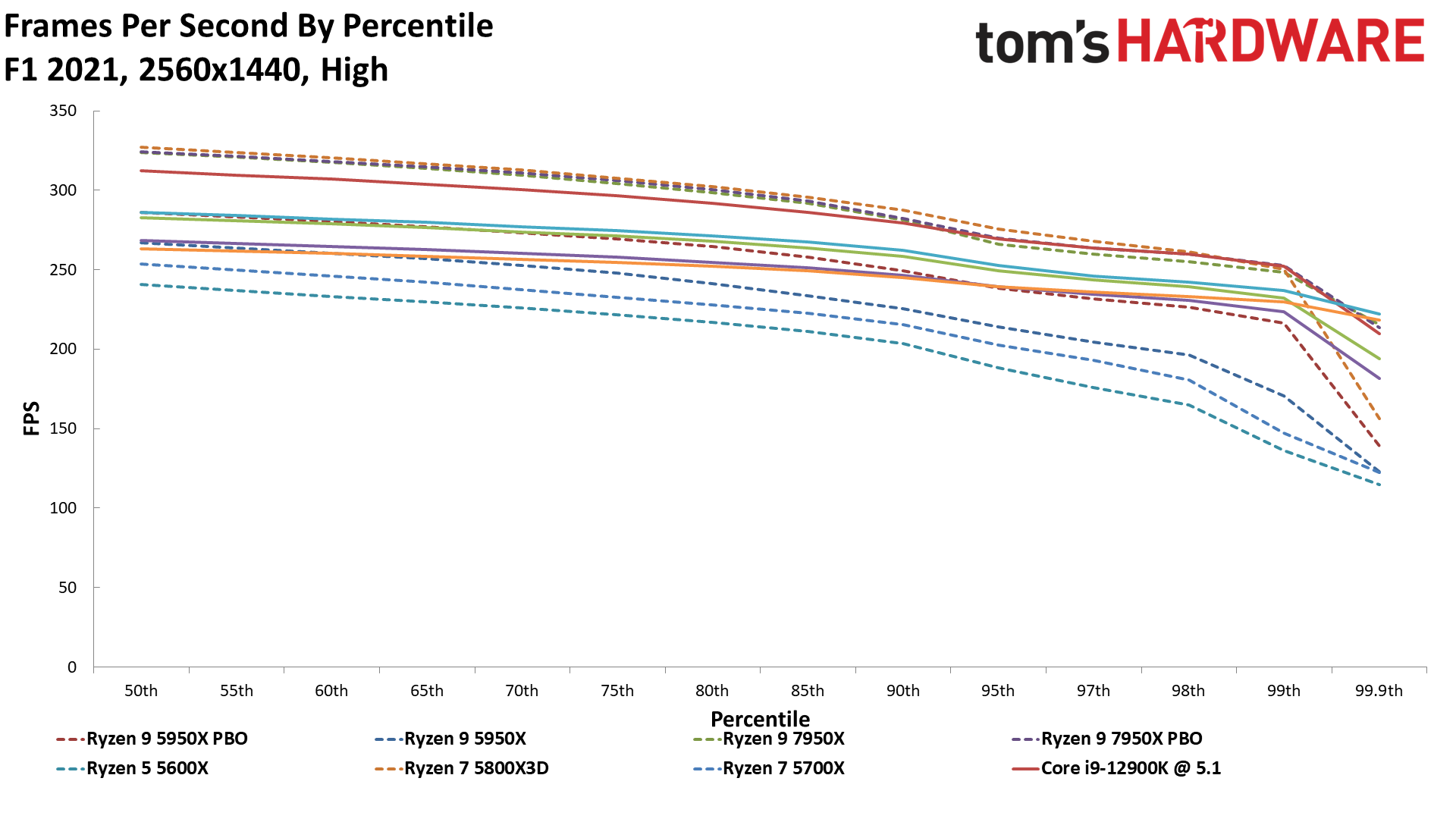
The Ryzen 7000 chips take the top of the chart in overall framerates, but like their prior-gen counterparts, they have proportionally lower 99th percentile framerates than the Alder Lake processors. We didn’t notice any outwardly visible rough play and we are looking at framerates in excess of 300 fps, so this is more of an interesting tendency than something that manifests as noticeably poor performance.
The Zen 4 chips take a big lead over the stock Intel comparables, with the 7950X being 16% faster than the 12900K and the 7600X taking a 20% lead over the 12600K. The Intel chips profit more from overclocking in this title than the Ryzen 7000 models, gaining roughly 10% while the new Ryzen chips gain around 5%. Again, this doesn’t matter much when peaks hit 300+ fps.
Hitman 3 on AMD Ryzen 9 7950X and Ryzen 5 7600X
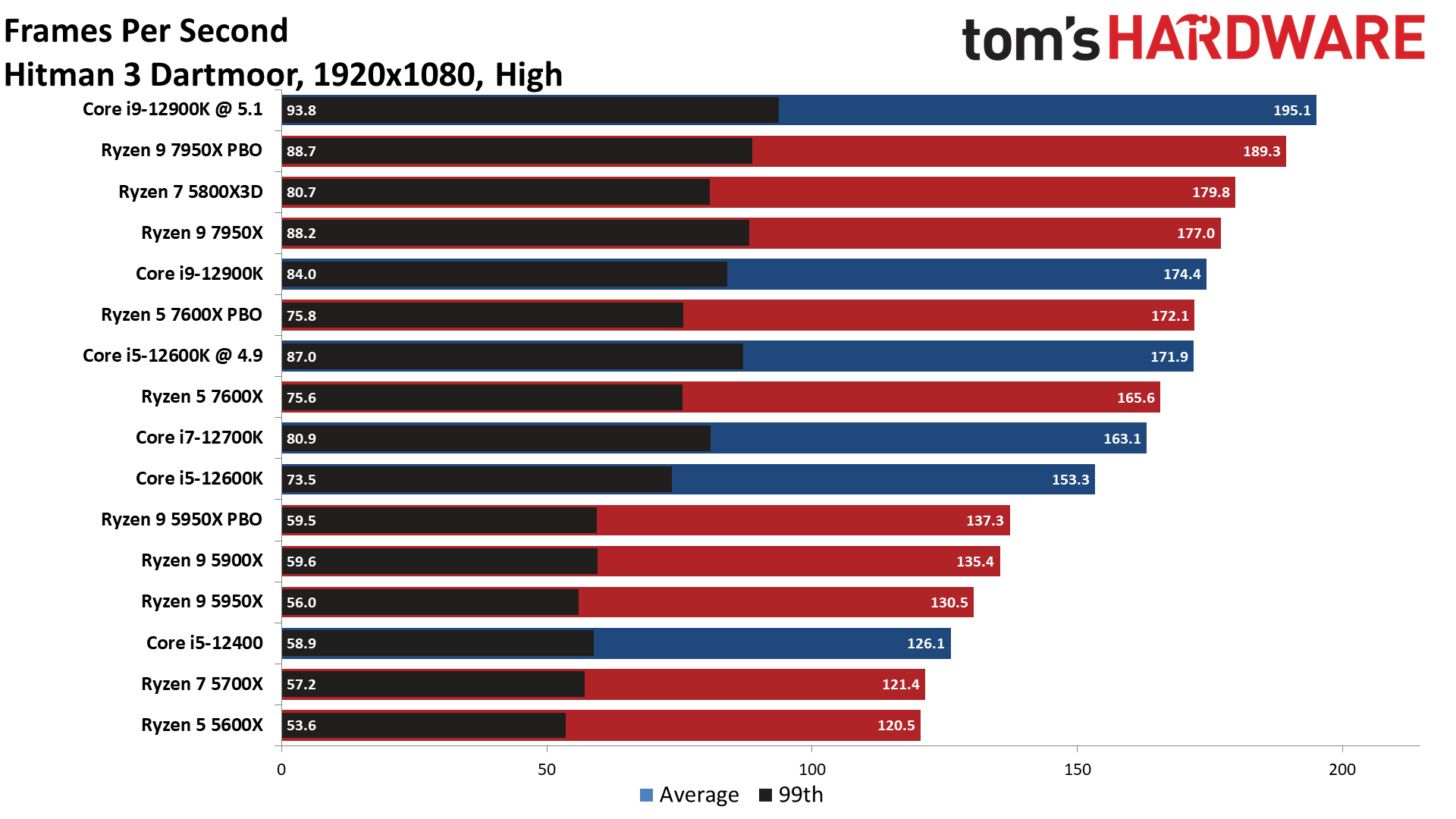
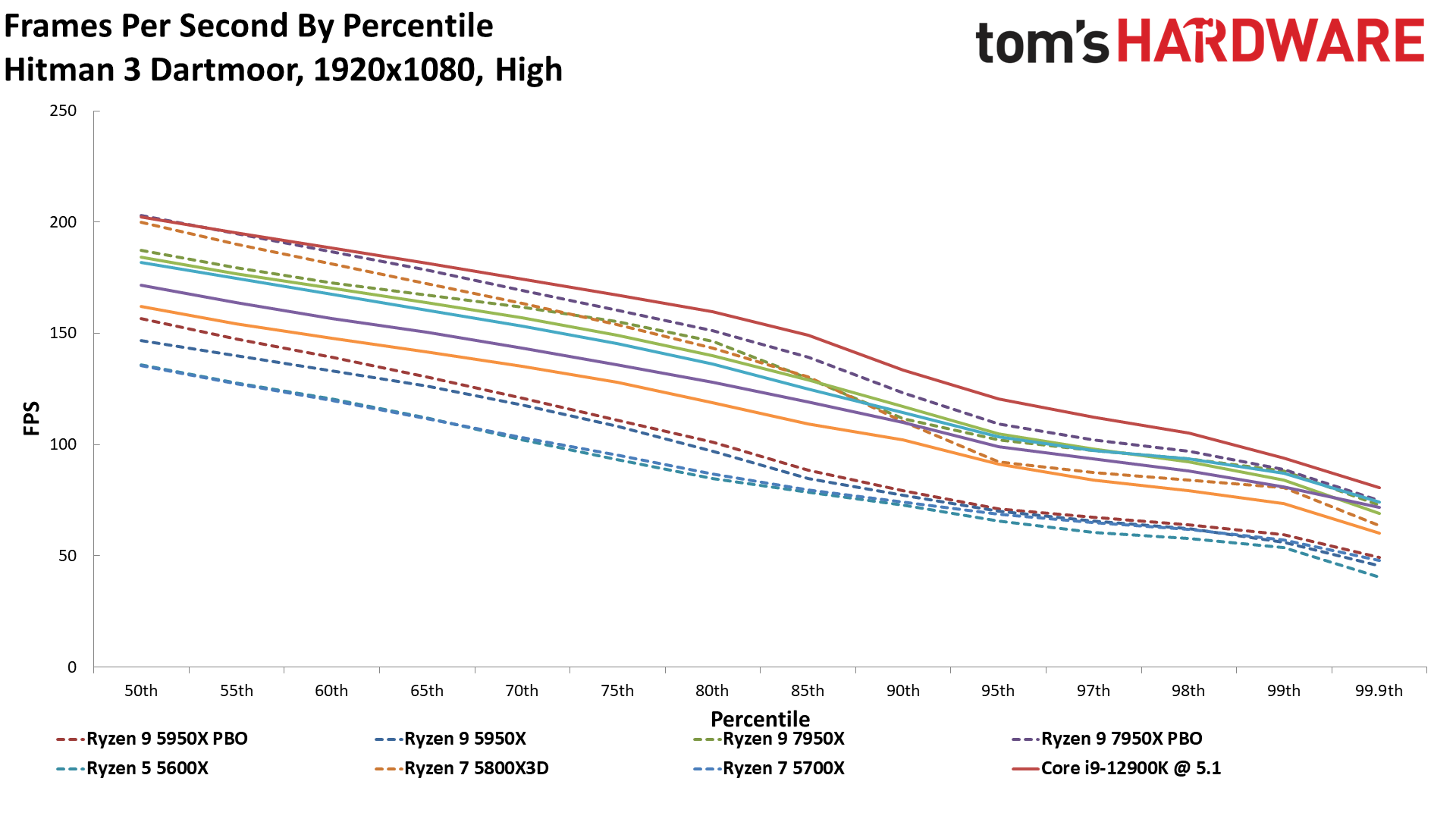
Intel used to enjoy a sizeable lead over Ryzen in Hitman 3 because the game is specifically tuned to leverage the E-cores effectively by offloading low-priority tasks like physics to the small cores. That changes with Ryzen 7000 as it takes the lead over Intel again, but the deltas between the price-comparable chips aren’t as pronounced as we see against the previous-gen Ryzen chips. For instance, the 7950X is 25% faster than the 5950X and the 7600X is 37% faster than the 5600X.
Horizon Zero Dawn on AMD Ryzen 9 7950X and Ryzen 5 7600X
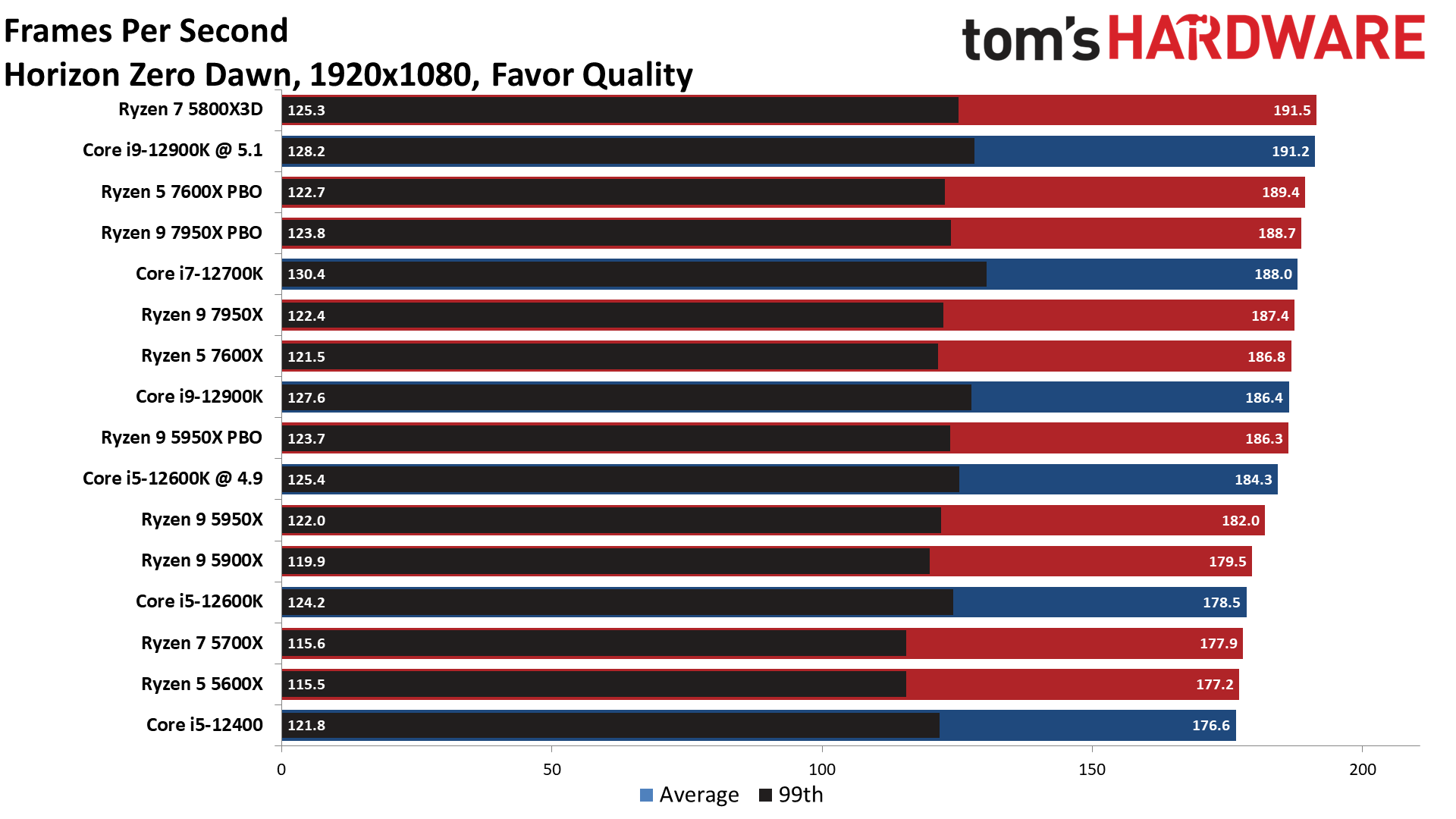
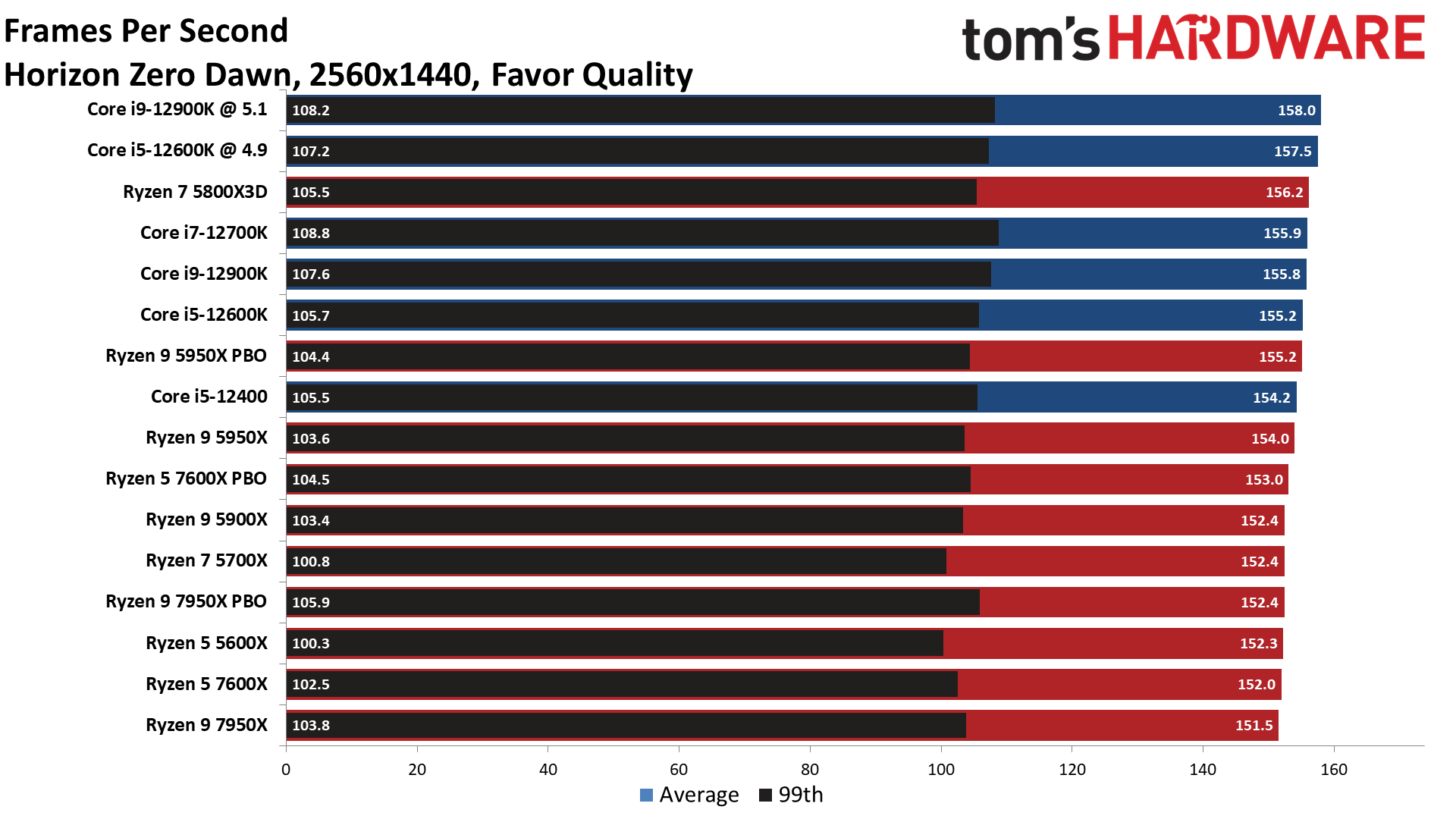
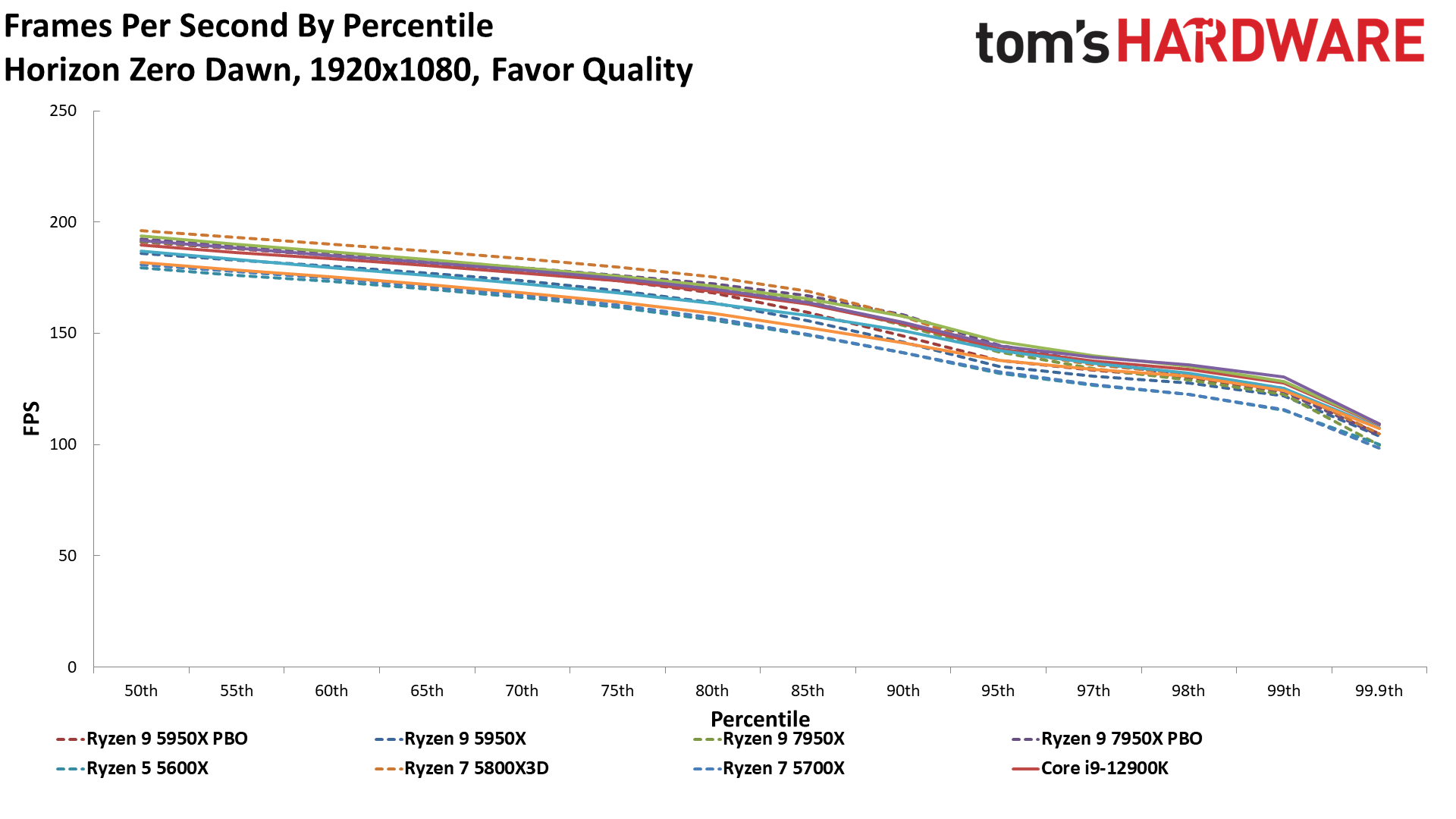
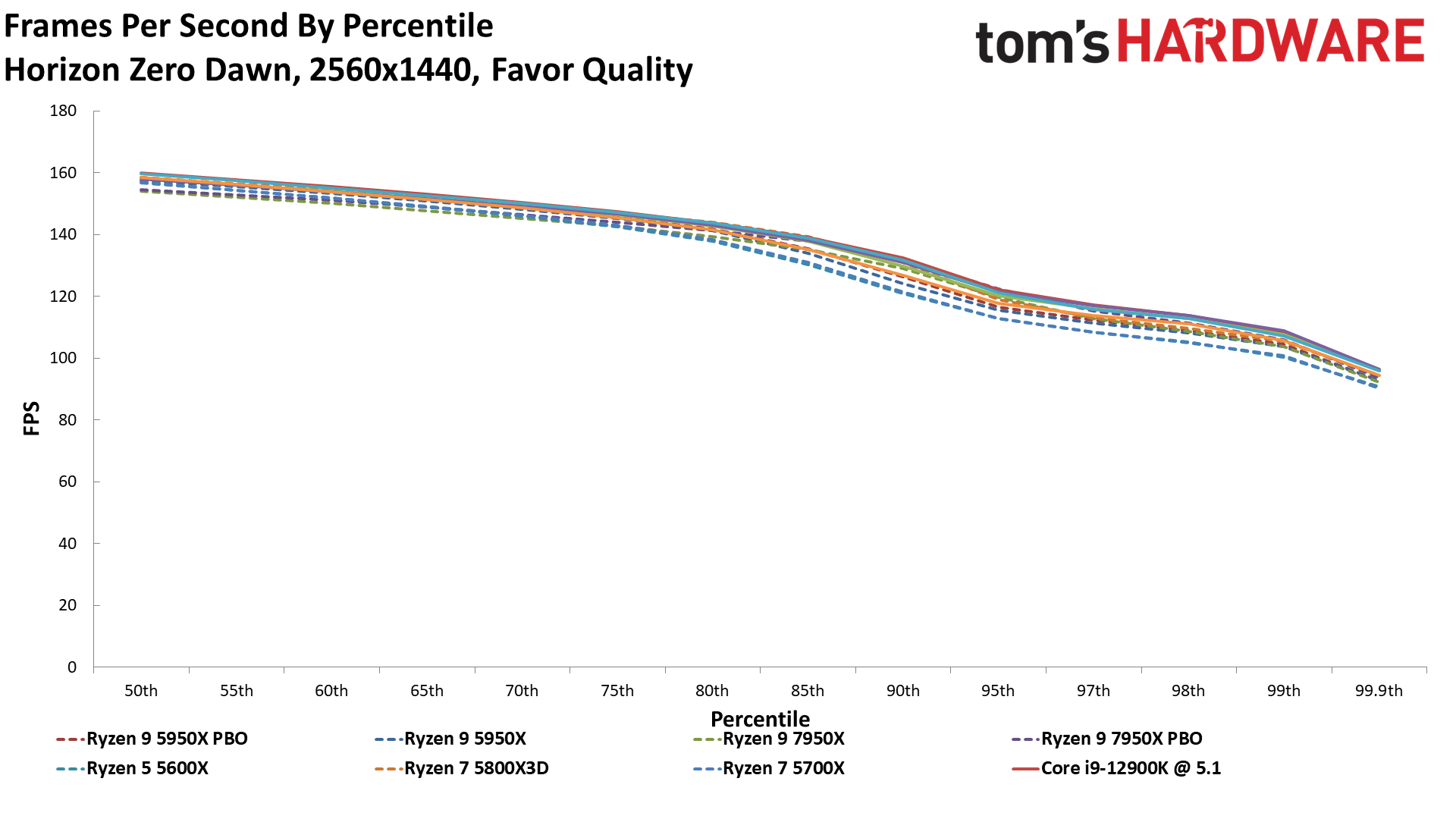
Horizon Zero Dawn doesn’t scale exceptionally well with more host processing power, so like many of the titles you’ll see in the real world, the delta between the highest-end chips can be slight.
Microsoft Flight Simulator 2021 on AMD Ryzen 9 7950X and Ryzen 5 7600X
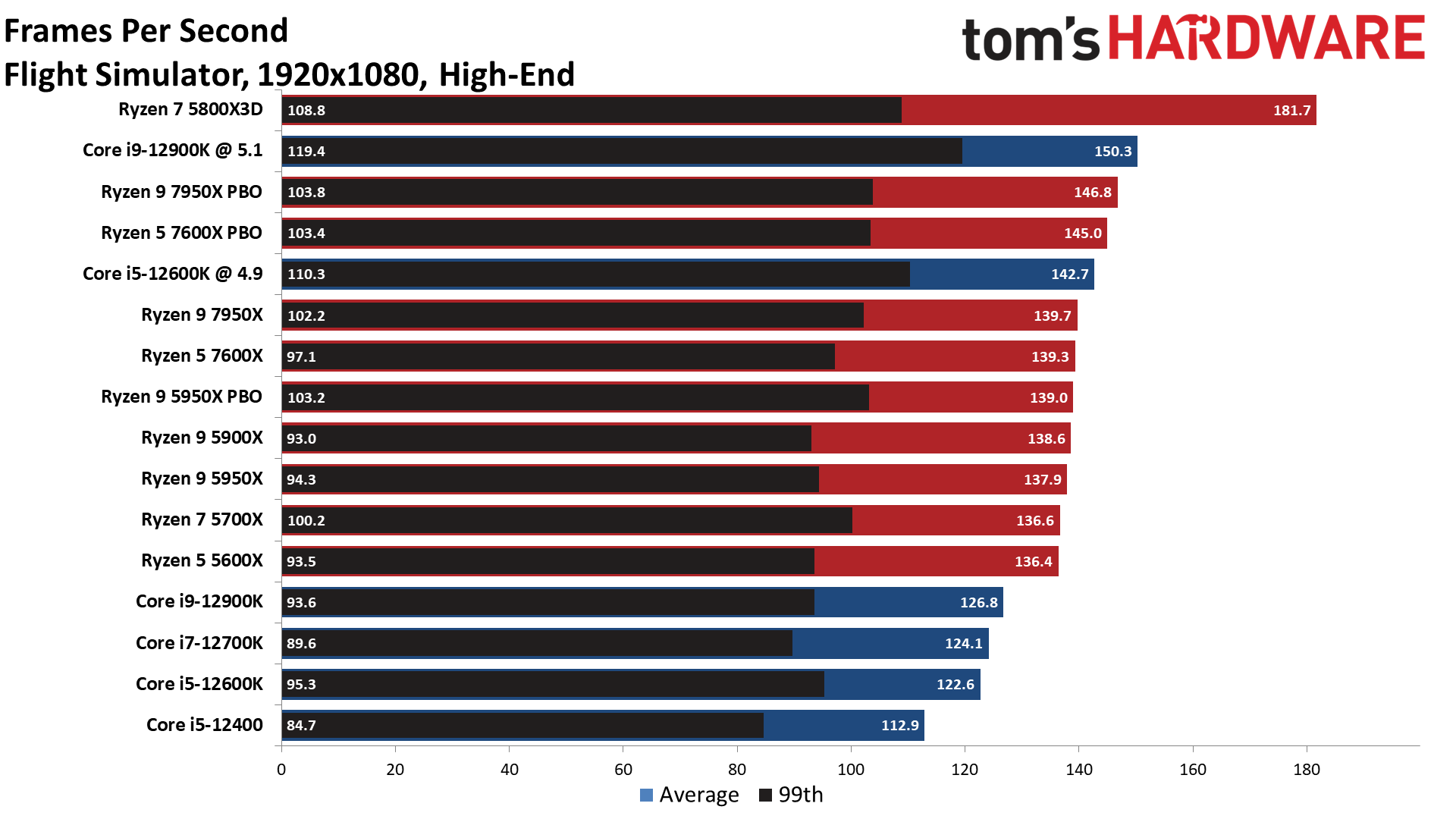
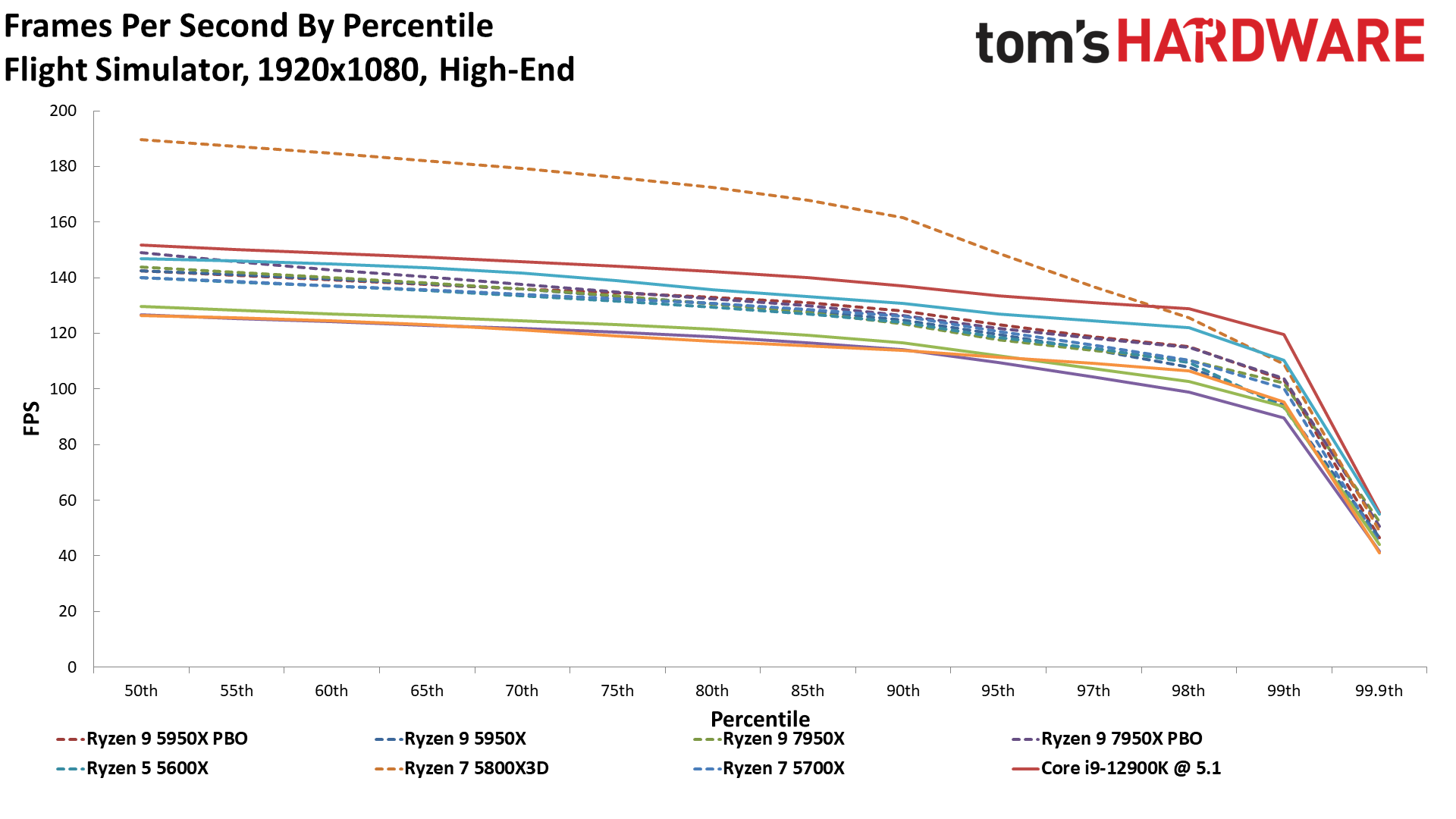
The Ryzen 7 5800X3D is simply outstanding in this title, highlighting that the chip can provide huge speedups in some titles. However, that can skew overall rankings. This is why the chip is, on average, the fastest gaming chip in the world, but be aware that can change drastically based on the game you’re playing.
The stock 7950X and 7600X lead the 12900K and 12600K by ~14%. The Intel 12900K and 12600K profit heavily from overclocking, gaining 19% and 16%, respectively, while the Ryzen 7000 chips gain roughly 5% from tuning. Despite Alder’s big overclocking gains, the tuned Ryzen chips land within a few percent of their price-comparable competitors.
Red Dead Redemption 2 on AMD Ryzen 9 7950X and Ryzen 5 7600X
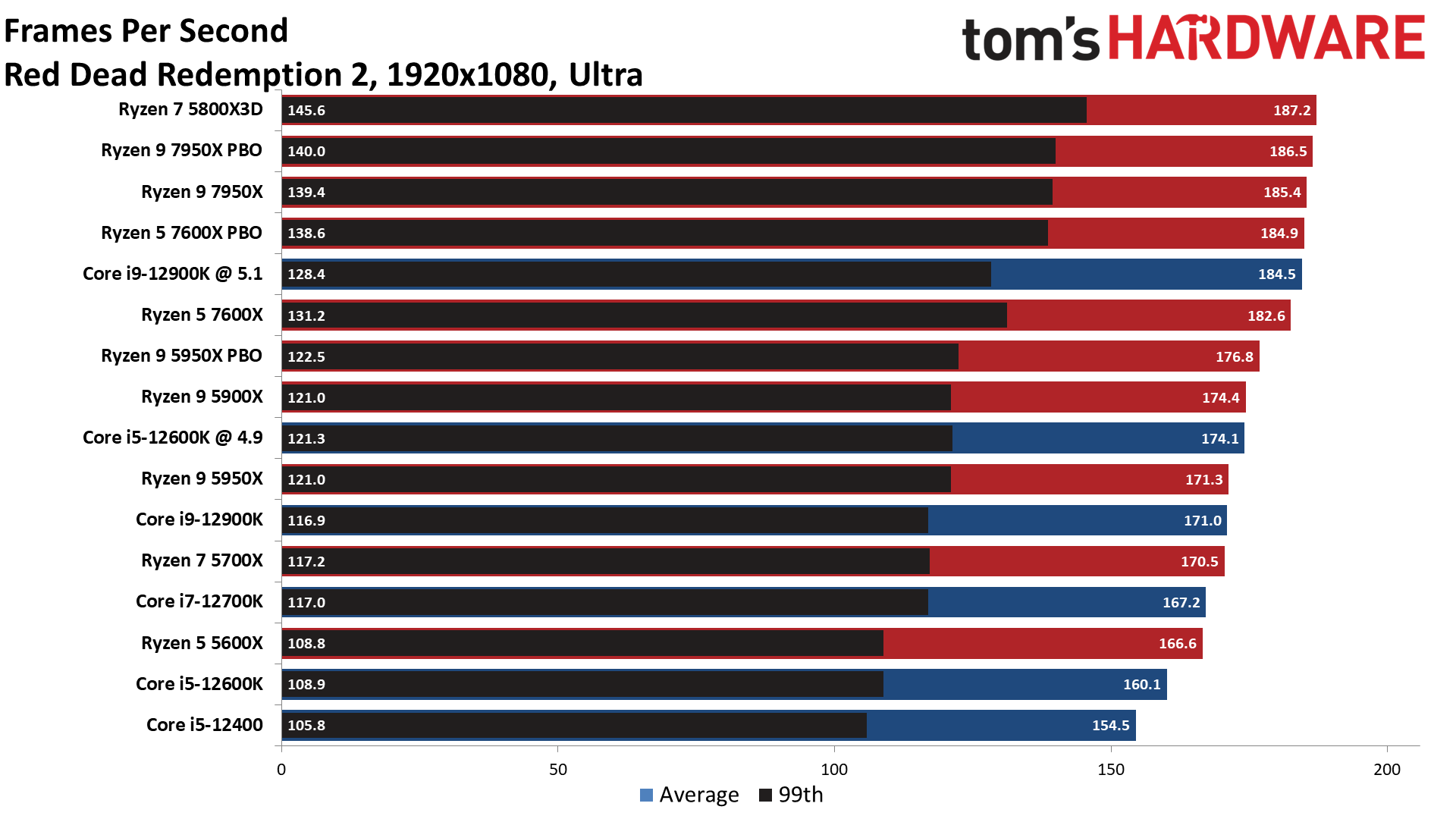
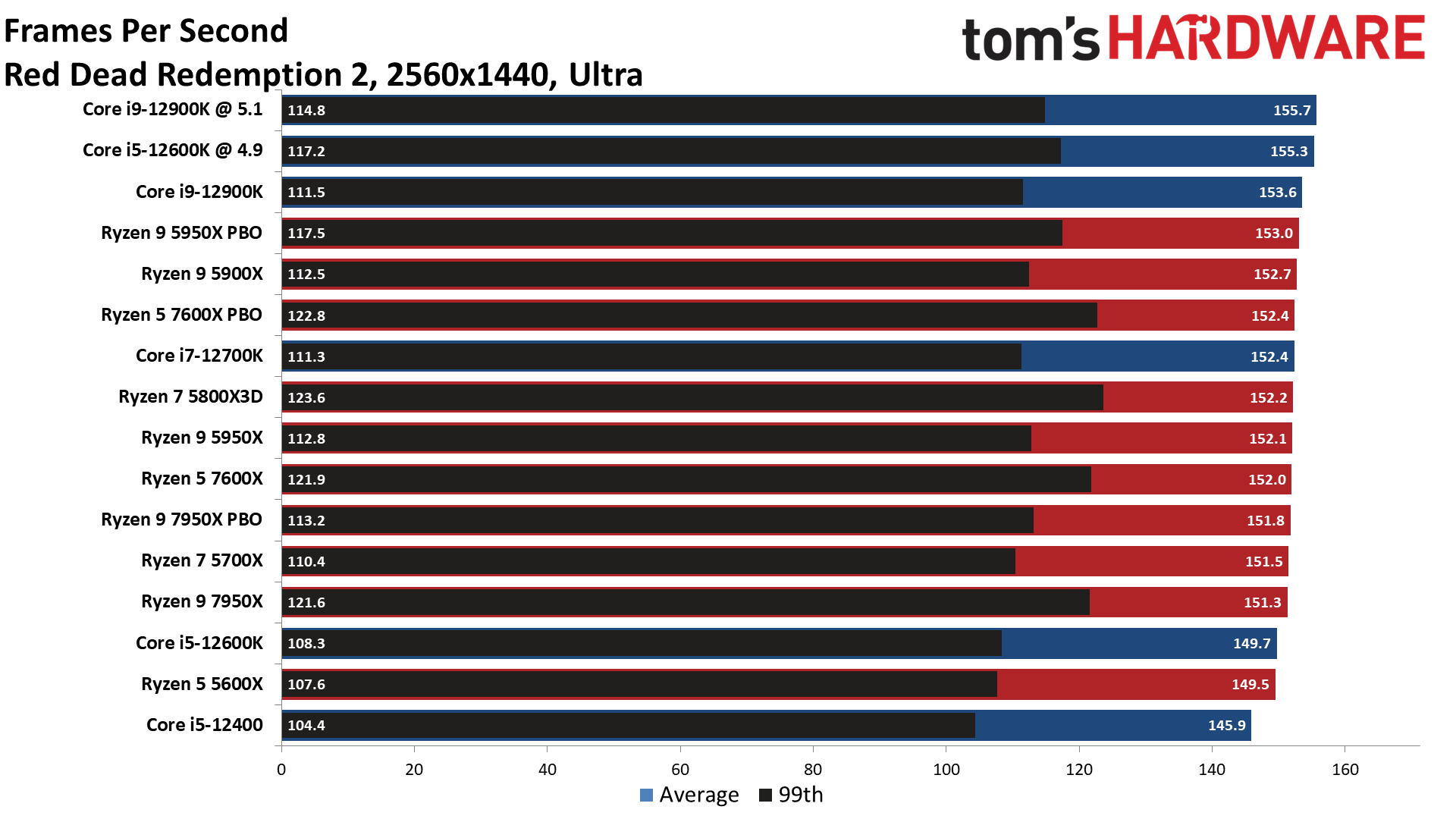
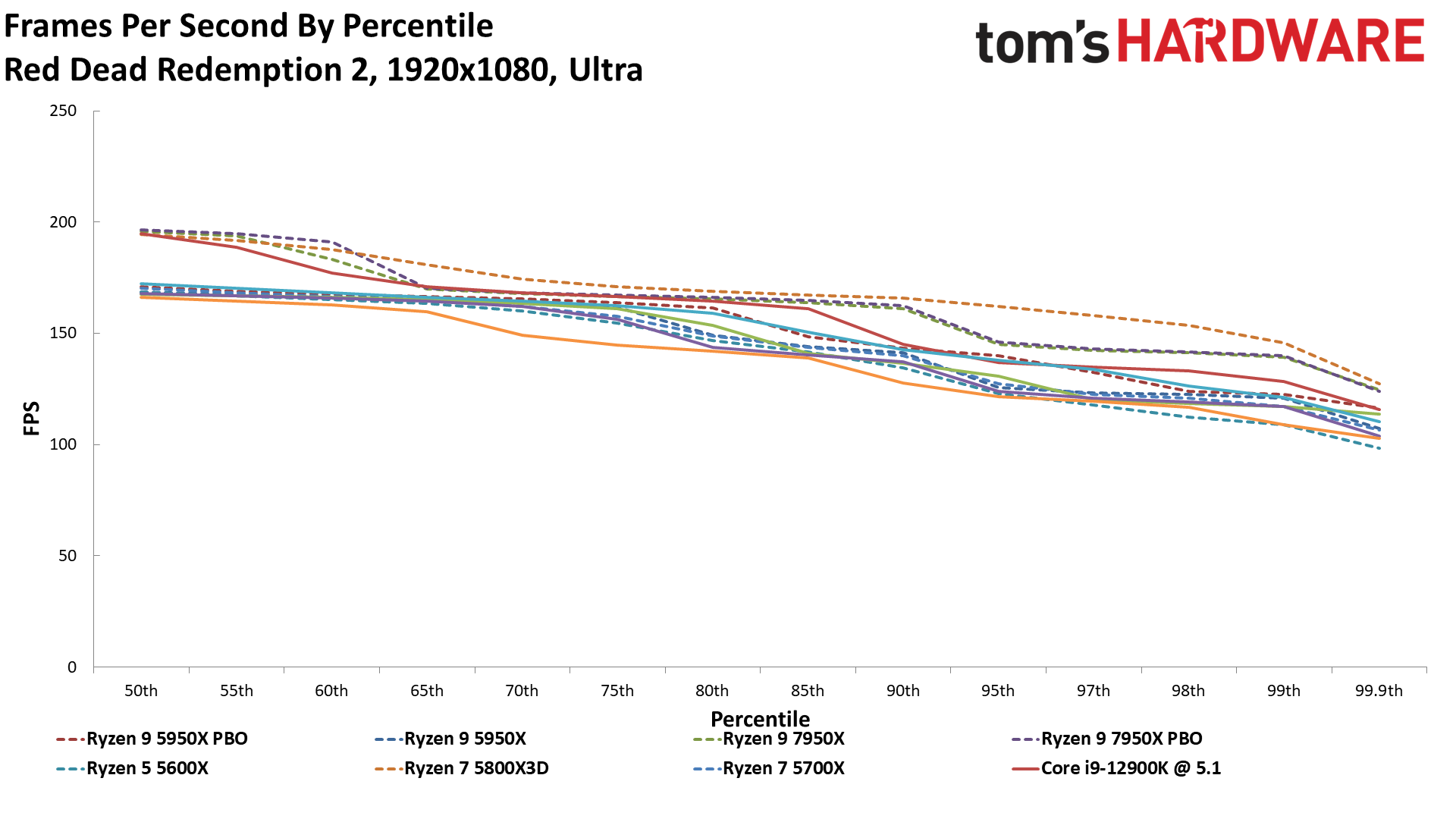
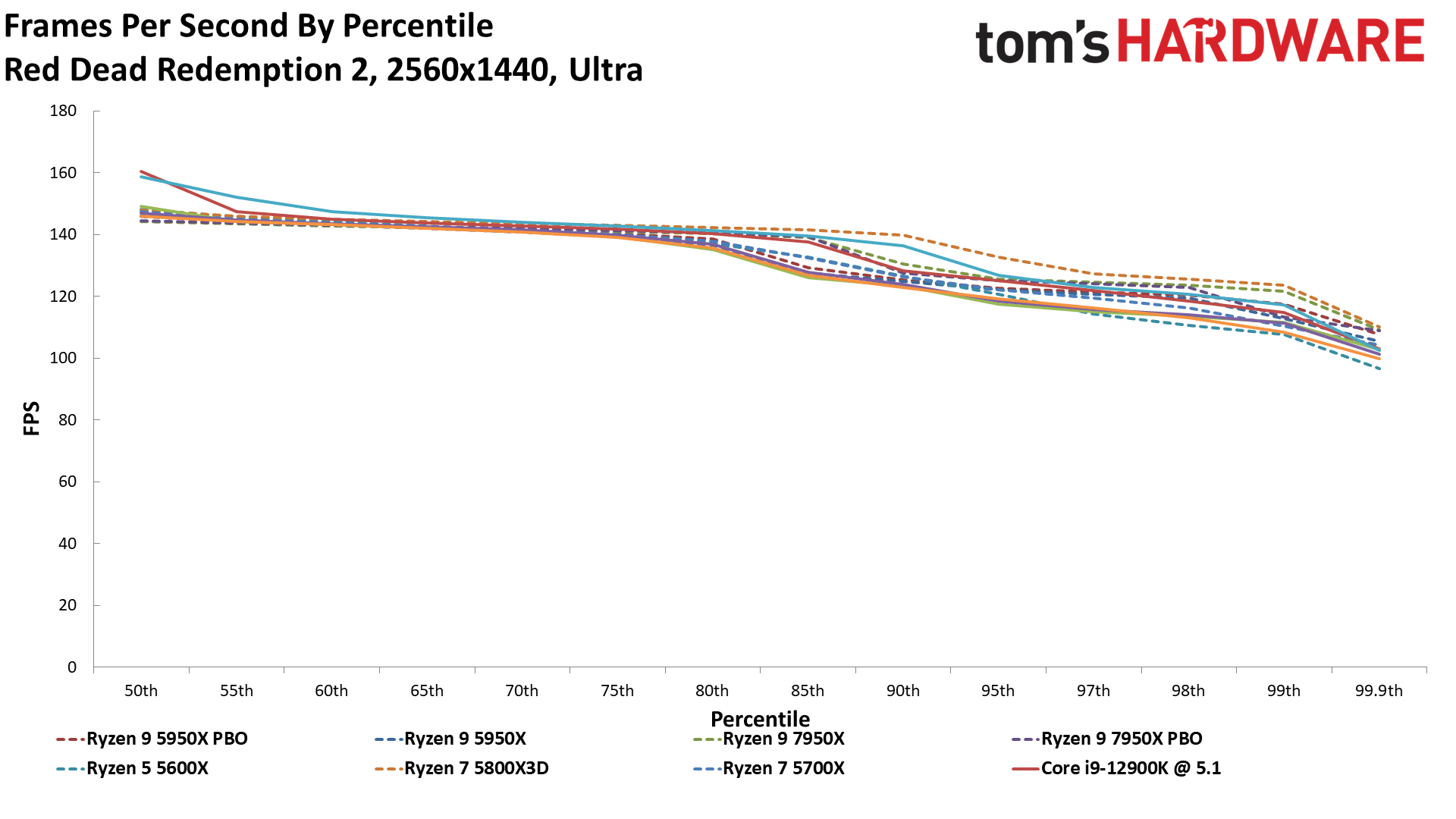
The 7950X leads the 12900K by 8%, while the 7600X continues to impress with very similar performance to its much more expensive counterpart. It’s also 14% faster than the 12600K.
Watch Dogs Legion on AMD Ryzen 9 7950X and Ryzen 5 7600X
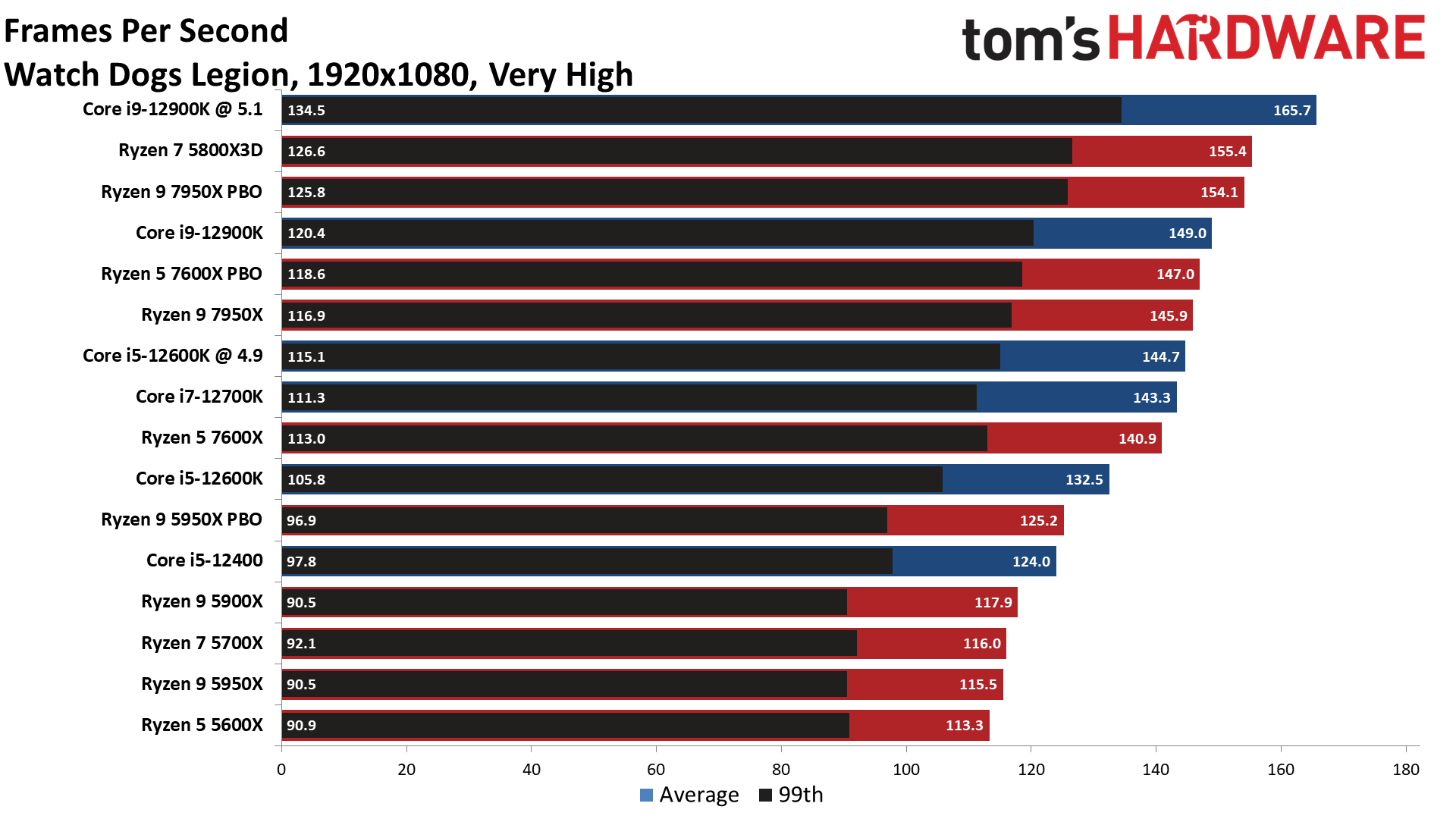
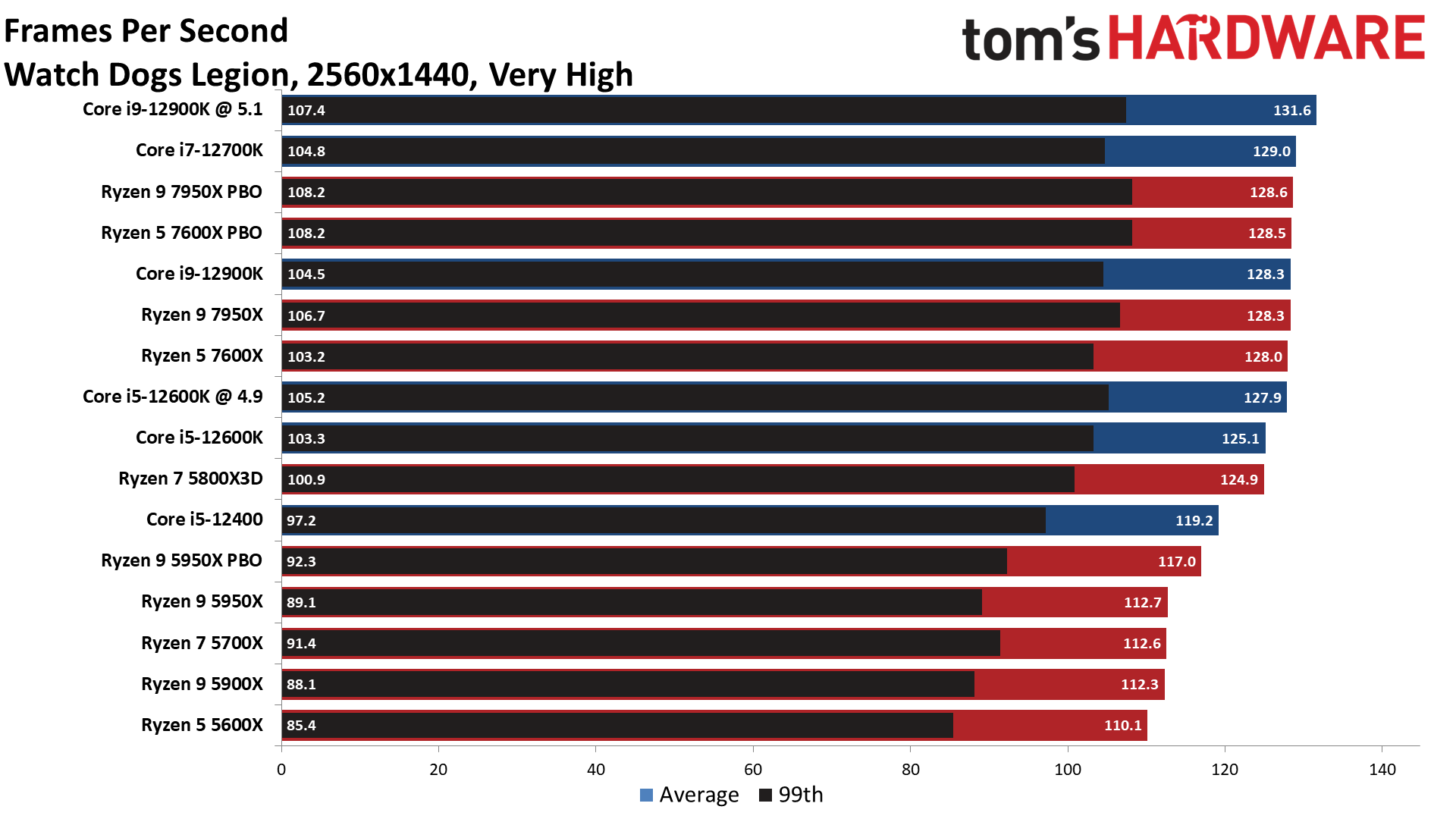
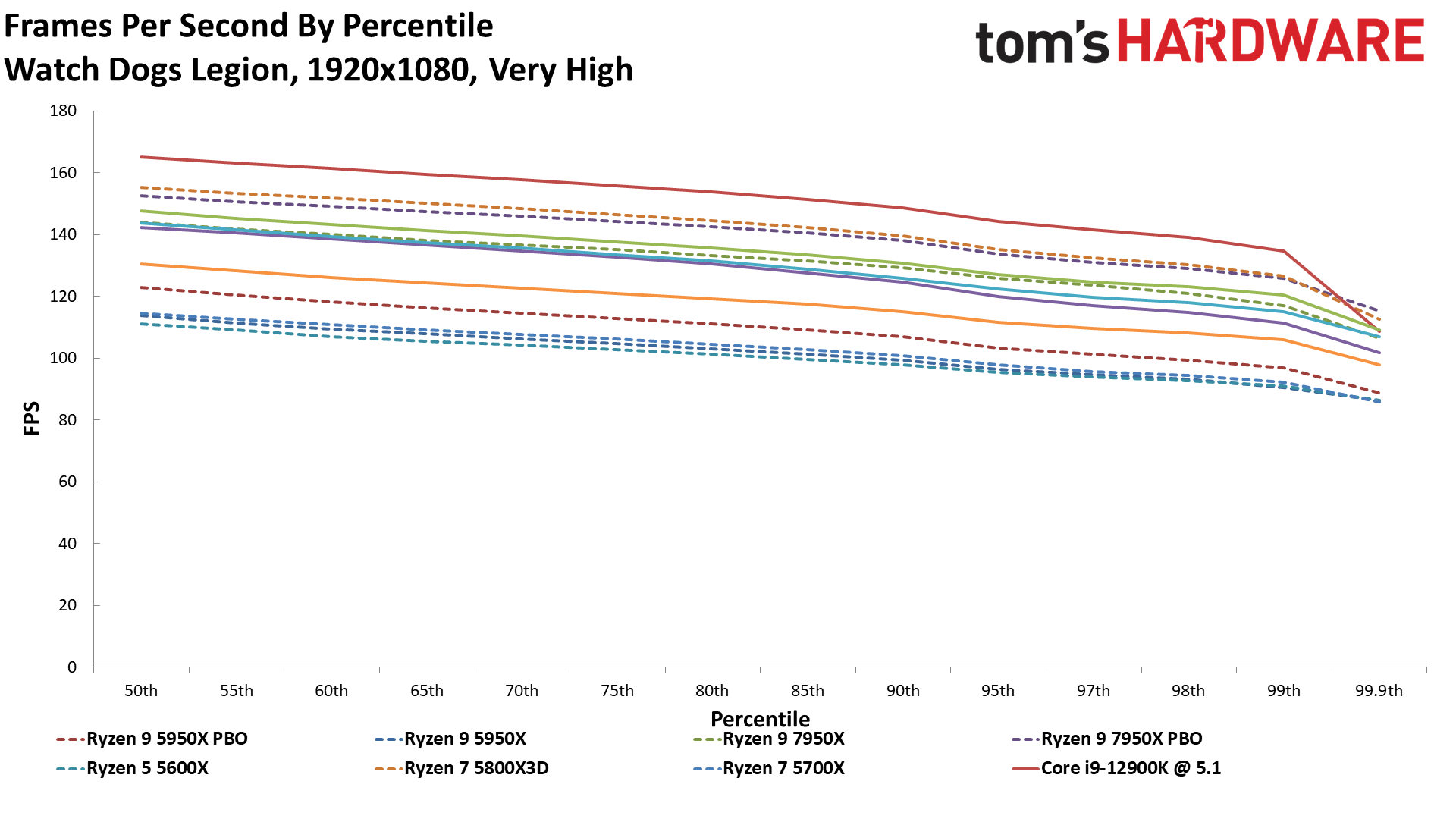
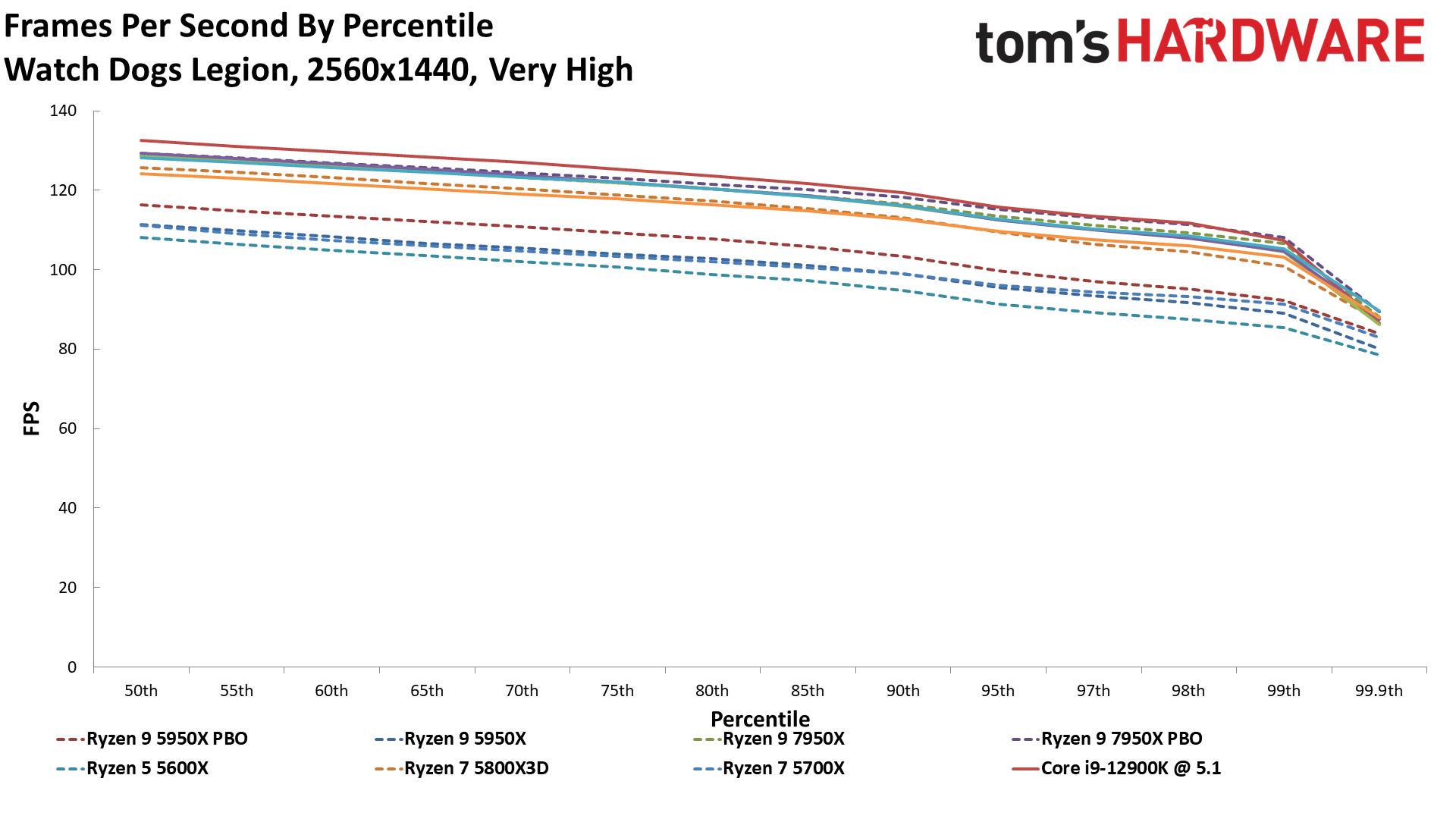
Watch Dogs Legion brings a much-needed win for the 12900K as we close out our gaming benchmarks. However, the 12900K’s 2% lead over the 7950X is slim. Meanwhile, the 7600X is 6% faster than the 12600K.
- MORE: Best CPUs for Gaming
- MORE: CPU Benchmark Hierarchy
- MORE: AMD vs Intel
- MORE: Zen 4 Ryzen 7000 All We Know
- MORE: Raptor Lake All We Know
Current page: Gaming Benchmarks on Ryzen 9 7950X and Ryzen 5 7600X
Prev Page Boost Frequencies, Power, and Thermals AMD Ryzen 9 7950X and Ryzen 5 7600X Next Page Desktop PC Application Benchmarks on Ryzen 9 7950X and Ryzen 5 7600X
Paul Alcorn is the Editor-in-Chief for Tom's Hardware US. He also writes news and reviews on CPUs, storage, and enterprise hardware.
-
-Fran- Thanks for the review(s)!Reply
Good to see more reaffirmation these CPUs don't have a performance problem, but a platform cost (or "cost of entry") problem with them. I hope AMD can alleviate it a bit so they become more of a mainstream crowd fav.
One small point that I won't really defend much, but buying into the AM5 platform, you buy into several years of support. The huge caveat is you have to trust not only AMD, but the partners to go with it and roll the BIOS updates down the line. This being said, after AM4, I'd imagine both AMD and partners have seen it does matter they do keep supporting newer CPUs and see that as a strength. Maybe partners would rather convince you to buy a new motherboard, but allowing this "mix and match" with generations does help overall sales; or so it is my impression. Plus, we all know which motherboard vendors actually followed through with the updates, so they'll get more sales once B650 launches. Could Tom's have the list of motherboards from the 300-series chipsets that do support Ry5K? That would actually help track which partners are indeed reliable and can be trusted with buying into AM5.
Regards. -
Alvar "Miles" Udell The headline: AMD Ryzen 9 7950X and Ryzen 5 7600X Review: A Return to Gaming DominanceReply
The reality: 5800X3D performs better in games than either of those. -
-Fran- Reply
To be pedantic, the title is correct. They now have more than just 1 CPU topping the charts and most (if not all) above Intel offerings.Alvar Miles Udell said:The headline: AMD Ryzen 9 7950X and Ryzen 5 7600X Review: A Return to Gaming Dominance
The reality: 5800X3D performs better in games than either of those.
You'd be correct if the title was something like "7950X is the new gaming overlord/king/champion*" or something that implies "the CPU is 1st in gaming", which as you clearly noticed, it is not.
Plus, it depends on the game anyway.
Regards. -
BogdanH I didn't read the article, simply because it's too long -quick view on some of pages gave me impression, that there's a lot of repeating from previous articles.. so why bother.Reply
Another reason why I didn't read, is the title. When I see a CPU like 7900X/7950X (or Intel's pendant) in conjunction with "gaming", I can already imagine the content. I assume, such title should grab the attention... I'm not sure who's attention, though. Are you trying to convince "gamers" to shell out 800€ for CPU alone? Yes, there's always said, that for gaming alone, it's "wiser" to get 7600X (or 5800X3D) -but such title still imply that 7950X is simply "the right thing"... "if you wish to have it all..". -again, that's my impression, so feel free to diagree.
Ok, so you say (for example), 7950X is 15% faster (in whatever) than 5950X. Now, some of this performance increase happens thanks to faster new DDR5 memory. And quite a lot performance increase (in my opinion) goes to much higher clock speed -which in turn comes back as heat dissipation. There's also faster PCIe5.0, etc ... Now I wonder, how much has actual CPU improved (compared to 5950X)? I mean IPC. Because if IPC is the same, then I see 7950X as a "brute force" improvement. In sense: Make it faster, no matter the costs (power draw & heat dissipation).
Yes, I know: 7950X finishes work faster (than 5950X) and so at the end, electricity bill will be lower. That's true if we look strictly from CPU side. But, if we take the cooling (of whole PC) into account, then the total power draw doesn't look that appealing anymore -especially in summer. In short: CPU is more efficient, but whole PC probably isn't.
I can read many times in forums, that many are already running their PC in eco-mode (to save energy, to make PC more silent, having less heat in room, etc) -they're ready to sacrifice fps by few percent for that. So I assume, what they wish or hope for, is certain performance increase, without affecting power draw -at least not by much.
I don't blame AMD/Intel/Nvidia for going into high power consumption direction. They know we wish everything faster (than it was in previous generation), so they do it -and many will buy it.. and that's the whole idea,
However, I do blame media for not putting more investigation/research into efficiency and write about that.
Just sharing my thoughts (being aware I may be wrong)
Bogdan -
DavidLejdar Reply-Fran- said:Thanks for the review(s)!
Good to see more reaffirmation these CPUs don't have a performance problem, but a platform cost (or "cost of entry") problem with them. I hope AMD can alleviate it a bit so they become more of a mainstream crowd fav.
...
If one wants to go for as cheap a build as possible e.g. just to play CS:GO, then yeah, the DDR5 requirement with AM5 may sure be off-putting. Myself, I will be upgrading in the near future from DDR3 anyhow, and (here) the extra cost for 32 GB DDR5-5200 (instead of DDR4-3200) is around 80 currently. At the same time, B650E has PCIe 5.0 both for GPU (16x) and NVMe at currently around 300-400 cheaper than what motherboards for Raptor Lake with the same connectivity cost (that is the few released so far). And only a handful of Alder Lake MBs have PCIe 5.0 for NVMe, while taking away 8 lanes from the GPU for that though.
So what I am currently looking at is around 250 for AM5 motherboard and 170 for 32 GB of DDR5 - which isn't as cheap as it can get, but should be plenty good for at least several years, giving me the option to upgrade individual parts later.
And to me that seems worth it to go for that, instead of saving perhaps 100 bucks with a Raptor Lake MB and DDR4 now, which likely won't support Meteor Lake already and would require me to get a lot of new parts then if I may want to boost performance in a year or two.
Of course, as you point out, not really a guarantee that even AMD directly may not push AM6 soon if Meteor Lake is taking it all to very new heights. But even if I upgrade the MB sooner than I was expecting, at least I will already have DDR5 to reuse, including having made use of it in the meantime.
BogdanH said:... . But, if we take the cooling (of whole PC) into account, then the total power draw doesn't look that appealing anymore -especially in summer. In short: CPU is more efficient, but whole PC probably isn't.
I can read many times in forums, that many are already running their PC in eco-mode (to save energy, to make PC more silent, having less heat in room, etc) -they're ready to sacrifice fps by few percent for that. So I assume, what they wish or hope for, is certain performance increase, without affecting power draw -at least not by much. ...
Very strictly taken, sure, the cooling uses some power too. But then again, a case fan has a power consumption of up to 6W, and CPU coolers (air or liquid) usually don't consume more than that. So even if all the cooling would take 20W at full load, that is 50 hours of full load to get to 1 kWh. And e.g. in the U.S., it is less than $1 for 4 kWh, isn't it?
The electricity costs can add up quickly though. E.g. if someone is gaming 50 hours a week at 700W, that's possibly up to 35 kWh right there, coming to 140 kWh a month.
Myself, I wouldn't know how to have that much time for gaming. So even if my rig would consume 700W, perhaps every other week to play at full load for a total of 10 hours, at the U.S. electricity price that would be less than $2.
Which isn't to say that it wouldn't be nice if there would be more improvement for power efficiency. But the review mentions that the Ryzen 5 7600X is a very sound choice for gaming (unless one can wait a few months to check out the gaming specific CPU). And that one has quite less Watt than the top tier one. And coupled with perhaps not the top-tier GPU around, e.g. the RTX 3060, which has around 200W, one can have a solid build which comes in at under 500W at full load. -
BogdanH Reply
-that's 20W (probably less) just to move hot air out of PC case into our room.. which we need to cool in summer days.DavidLejdar said:Very strictly taken, sure, the cooling uses some power too. But then again, a case fan has a power consumption of up to 6W, and CPU coolers (air or liquid) usually don't consume more than that. So even if all the cooling would take 20W at full load...
Many say, it's "only 10€/year more" (or whatever number).. but there are millions of PC's running. And if looking that way, we can see see how much energy is wasted.. and is really not about who can afford to pay electricity and who can't.
Best wishes,
Bogdan -
chalabam Der Bauer has shown that this CPU is 20 degrees hotter than it should be due to bad packagingReply -
Sluggotg Nice new lineup for AMD. Looking forward to the industry moving to PCIE 5 and USB 4. The 7600 is very impressive. (For 300 Bucks!). With Intel's new chips coming out next month we should see some very healthy competition that will hopefully lead to overall lower prices. With the New CPUs and the New Graphics cards all coming out in the next several months, we should be able to do some nice upgrades. Hopefully the Scalpers will fail to corner the market.Reply -
-Fran- Reply
Er... Paul (the article) did include IPC measurements and a couple parragraphs to that. Zen4 is indeed faster, clock for clock, than Zen3. It's just it gets more overall performance from the increased clocks (hence the higher power budget) than raw IPC improvements.BogdanH said:I didn't read the article, simply because it's too long -quick view on some of pages gave me impression, that there's a lot of repeating from previous articles.. so why bother.
Another reason why I didn't read, is the title. When I see a CPU like 7900X/7950X (or Intel's pendant) in conjunction with "gaming", I can already imagine the content. I assume, such title should grab the attention... I'm not sure who's attention, though. Are you trying to convince "gamers" to shell out 800€ for CPU alone? Yes, there's always said, that for gaming alone, it's "wiser" to get 7600X (or 5800X3D) -but such title still imply that 7950X is simply "the right thing"... "if you wish to have it all..". -again, that's my impression, so feel free to diagree.
Ok, so you say (for example), 7950X is 15% faster (in whatever) than 5950X. Now, some of this performance increase happens thanks to faster new DDR5 memory. And quite a lot performance increase (in my opinion) goes to much higher clock speed -which in turn comes back as heat dissipation. There's also faster PCIe5.0, etc ... Now I wonder, how much has actual CPU improved (compared to 5950X)? I mean IPC. Because if IPC is the same, then I see 7950X as a "brute force" improvement. In sense: Make it faster, no matter the costs (power draw & heat dissipation).
Yes, I know: 7950X finishes work faster (than 5950X) and so at the end, electricity bill will be lower. That's true if we look strictly from CPU side. But, if we take the cooling (of whole PC) into account, then the total power draw doesn't look that appealing anymore -especially in summer. In short: CPU is more efficient, but whole PC probably isn't.
I can read many times in forums, that many are already running their PC in eco-mode (to save energy, to make PC more silent, having less heat in room, etc) -they're ready to sacrifice fps by few percent for that. So I assume, what they wish or hope for, is certain performance increase, without affecting power draw -at least not by much.
I don't blame AMD/Intel/Nvidia for going into high power consumption direction. They know we wish everything faster (than it was in previous generation), so they do it -and many will buy it.. and that's the whole idea,
However, I do blame media for not putting more investigation/research into efficiency and write about that.
Just sharing my thoughts (being aware I may be wrong)
Bogdan
Regards. -
hotaru251 so zen 3 they held out entire generation for a 5700xReply
and now zen 4 its the 7800x missing...AMD ffs why do you do this?
and as said before...the cpu are great, but platform isnt worth it with 5800x3d existing.
(will likely change by time weg et 3d cache zen4 cpus)